Posts Tagged ‘Joanne Leedom-Ackerman’
PEN Journey 40: The Role of PEN in the Contemporary World
PEN International celebrates its Centenary in 2021. I’ve been active in PEN for more than 30 years in various positions and now as an International Vice President Emeritus. With memories stirring and file drawers of documents and correspondence bulging, I am a bit of a walking archive and have been asked by PEN International to write down memories. I hope this personal PEN journey will be of interest.
At the end of September 2005 a Danish newspaper published 12 editorial cartoons which depicted Mohammed in various poses as part of a debate over criticism of Islam and self-censorship. Muslim groups in Denmark objected, and by early 2006 protests, violent demonstrations and even riots erupted in Muslim areas around the world. The offense was the “blasphemy” of drawing Mohammed in the first place and the particular mockery of some of the depictions in the cartoons.
The uproar over the Jyllands-Posten Mohammed cartoons quickly drew PEN into the controversy, first through Danish PEN and then through the International PEN office and other PEN Centers. PEN included many Muslim members and numbers of centers in majority Muslim countries. All PEN members and centers endorse the ideals stated in the PEN Charter. However, the third and fourth articles of the Charter which addressed the situation, also at times appeared to contradict each other:
Article 3: “Members of PEN should at all times use what influence they have in favour of good understanding and mutual respect between nations and people; they pledge themselves to do their utmost to dispel all hatreds and to champion the ideal of one humanity living in peace and equality in one world.”
Article 4: “PEN stands for the principle of unhampered transmission of thought within each nation and between all nations, and members pledge themselves to oppose any form of suppression of freedom of expression in the country and community to which they belong as well as throughout the world wherever this is possible. PEN declares for a free press and opposes arbitrary censorship in time of peace. It believes that the necessary advance of the world toward a more highly organized political and economic order renders a free criticism of governments, administrations and institutions imperative. And since freedom implies voluntary restrain, members pledge themselves to oppose such evils of a free press as mendacious publication, deliberate falsehood and distortion of facts for political and personal ends.”
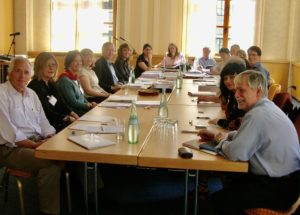
PEN International Board and Staff 2006. L to R: Eric Lax (PEN USA West), Elizabeth Nordgren (Finish PEN), Jane Spender (Programs Director) Sara Whyatt (Writers in Prison Committee Director), Eugene Schoulgin (Norweigan PEN), Caroline McCormick Whitaker (Executive Director), Karen Efford (Programs Officer), Joanne Leedom-Ackerman (International Secretary), Jiří Gruša (International President), Judith Rodriguez (Melbourne PEN), Britta Junge-Pederson (Treasurer), Judith Buckrich (Women Writers Committee Chair), Chip Rolley (Search Committee Chair), Sylvestre Clancier (French PEN), Sibila Petlevski (Croatian PEN), Peter Firkin (Centers Coordinator) [not pictured: Mohammed Magani (Algerian PEN), Karin Clark (WiPC Chair), Kata Kulavkova ( Translation and Linguistic Rights Chair)
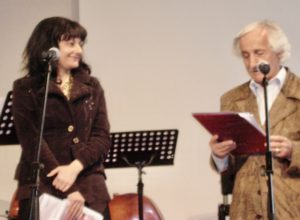
Peace Committee program 2006. Sibila Petlevski (Croatian PEN), Veno Taufer (Peace Committee Chair)
At the Peace Committee conference that April, I observed, “The Charter of PEN asserts values that can appear contradictory, but represent the dialectic upon which free societies operate and tolerate competing ideas…In our 85th year, International PEN still represents that longing for a world in which people communicate and respect differences, share culture and literature, and battle ideas but not each other.”
The Danish cartoon controversy led off 2006. For me, the PEN year also included attending the conferences of three of PEN’s four standing committees—the Peace Committee in Bled, Slovenia, Writers in Prison Committee in Istanbul, Turkey (PEN Journey 35) and Translation and Linguistic Rights Committee in Ohrid, Macedonia (PEN Journey 39)—and in May the 72nd PEN World Congress in Berlin, and later a Danish Conference on the Middle East in Copenhagen, the Gothenburg Book Fair in Sweden, a PAN Africa Conference in Dakar, Senegal and a trip to Moscow, where I went to watch my oldest son compete in the European Wrestling Championships and visited Russian PEN on a mission.
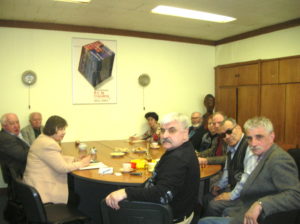
Russian PEN members meeting in Russian PEN office, including Alexander Tkachenko, General Secretary, 2006
To Moscow I took just under $10,000 raised by PEN centers and buried in my luggage to help the Russian PEN Center. Vladimir Putin and the Russian government had begun to crackdown on nongovernmental organizations with ties to other countries. One of their first targets was Russian PEN which had opposed the legislation restricting nongovernmental organizations. At the time I was also on the board of Human Rights Watch, a larger organization which was watching closely what was happening to PEN. The government’s attack on Russian PEN came in the form of a freeze on all assets for failure to pay a land tax. Russian PEN argued that it was a legal tenant where it had been conducting business and was not liable for the tax on the land, but the tax office refused to drop the charges. The government threatened to close PEN and take away its office if the money wasn’t paid. An appeal had gone out to PEN’s other centers, which had responded from around the globe not only with protests to Moscow but also with funds for Russian PEN.
I brought in funds just under the amount I would have had to declare. During the wrestling tournament I met with Alexander (Sascha) Tkachenko, the General Secretary of Russian PEN, and delivered to him the donation, and he gave me a receipt. The funds stayed off the crisis for then. Charges were dropped. A Russian Minister said, “I don’t understand. I was getting letters from as far away as Argentina!” Sascha answered him: “That is the kind of organization we are.” PEN continued to operate.
In Moscow I also met with Russian PEN members as well as with Turkmen author Rakhim Esenov, who was visiting Russian PEN. I had met Esenov a few weeks before in New York where he had won PEN America’s Barbara Goldsmith Freedom to Write award. In Turkmenistan Esenov had been charged with “inciting social, national and religious hatred using the mass media” because of characters in his novel The Crowned Wanderer. Set in the 16th century Mogul Empire, the story focused on a poet/philosopher/army general who was said to have saved Turkmenistan from fragmentation. The president of Turkmenistan Saparmurad Niyazov banned the book for portraying the main character as a Shia rather than a Sunni Muslim, and he imprisoned Esenov for several months. I still have the massive Russian language volume he shared with me, a work that had taken him years to write.
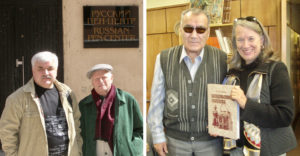
L to R: Russian PEN General Secretary Alexander (Sascha) Tkachenko and Russian PEN member outside Russian PEN office in Moscow and Rakhim Esenov, author of The Crowned Wander and Joanne Leedom-Ackerman (PEN International Secretary), 2006
At the Peace Committee conference earlier that month I’d presented a paper on the conference theme “The Role of PEN in the Contemporary World,” a broad and challenging topic which had inspired me to peer both backward and forward.
Below is the beginning of that paper with a link to the rest:
My first memory of a PEN meeting was sitting in someone’s living room in Los Angles writing postcards to free Wei Jingsheng from prison in China. At the time in the 1980’s he’d already been in prison several years of a fifteen-year sentence. I had no idea who this writer was thousands of miles away. I barely knew the other writers in that living room. On the coffee table would have been PEN’s Case List, which at the time was white sheets of paper stapled together.
We wrote and stamped our post cards for Wei and other writers that afternoon. I’m sure we were provided with background on his case. I pictured these cards fluttering into a jail somewhere in China and perhaps even into the cell of this stranger to let him know we had taken note of him and cared what happened. Looking back on the blue-sky afternoon as we sipped sodas and ate crackers and cheese, I see our act as a bit fleeting, an effort to imagine the fate of another writer who didn’t have our freedom to write and speak…[continue reading here]
Next Installment: PEN Journey 41: Berlin—Writing in a World Without Peace
PEN Journey 39: Spiritus Loci—Literature as Home
PEN International celebrates its Centenary in 2021. I’ve been active in PEN for more than 30 years in various positions and now as an International Vice President Emeritus. With memories stirring and file drawers of documents and correspondence bulging, I am a bit of a walking archive and have been asked by PEN International to write down memories. I hope this personal PEN journey will be of interest.
[From address at Translation and Linguistic Rights Committee Conference September, 2006:]
I Left My Shoes in Macedonia.
Last year at this conference, I packed in a rush, left behind a pair of shoes, but in the process got a title for a story.
I Left My Shoes in Macedonia.
I don’t yet know what story will emerge, or maybe only this brief talk will emerge, but Macedonia makes the title work, at least to my mind. I Left My Shoes in England…that doesn’t work…I Left My Shoes in France?…No. I Left My Shoes in the United States…please. I look forward to discovering who left the shoes and what the circumstances were and most of all what Macedonia has to do with the story.
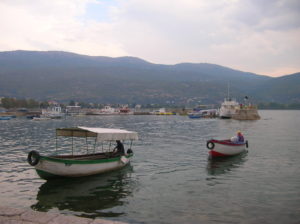
Ohrid, Macedonia, setting of PEN International Translation and Linguistic Rights Committee conference, 2006.
Exploring the conference theme spiritus loci will be part of the journey. As writers we know the power of place in literature and in our lives. The Latin term meaning the local spirit of a place is not always easily defined, but it relates to the geography, the history, the architecture and the people, who are both shaped by and shape the place. The ancient Romans thought every location had a spirit, some benign where people would live longer, happier lives and some evil and destructive of human well-being.
Today in a world grown smaller and more connected by jet travel, the internet, the global village, the cyber global village, with the blending of cultures and commerce worldwide, spiritus loci is perhaps a more fluid concept and to a younger generation, even a digital concept. On the internet I discovered a recording studio with the name Spiritus Loci; it moved from place to place recording people’s music wherever the musicians felt most comfortable.
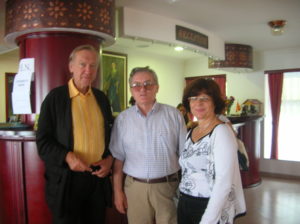
Eugene Schoulgin (Norwegian PEN) Dimitar Basevski (President Macedonian PEN), and Kata Kulavkova (Macedonian PEN & Chair PEN International’s Translation and Linguistic Rights Committee)
It is still the writer who can best capture a place and a people and render that spiritus loci for the reader. The best writers unveil the unity between location and character so that the writer’s version becomes the backdrop for understanding the place for generations to come, whether it be Tolstoy’s Russia, Balzac’s France, Dickens’ England, Achebe’s Nigeria, Toer’s Indonesia, Fuentes’ Mexico.
Through PEN we have the opportunity to know writers and their literature from around the globe and also to visit and experience the places from which they come. I’ve had the pleasure of coming to Macedonia four times and to this most beautiful city of Ohrid because of PEN.
With 144 centers in 101 countries, PEN has members who live and operate in most regions of the globe, with different histories, geographies, races, religions, cultures, but with the common spiritus loci of ideals. Today, these ideals, which were developed between World Wars, continue to promote a shared humanity on earth. PEN members work to use “what influence [we] have in favor of good understanding and mutual respect between nations…to do [our] utmost to dispel race, class and national hatreds, and to champion the idea of one humanity living in peace in the world.” This mandate provides its own kind of spiritus loci no matter where one lives. It is a compass that points both to the ground we occupy and the future we hope to achieve.
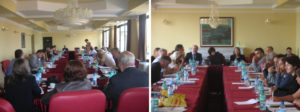
Meeting at 9th Ohrid Conference of PEN International’s Translation and Linguistic Rights Committee, 2006
Macedonia and its neighbors have been at the center of the struggle for those ideals in the last decade. In 2001 when the fires from the Balkan wars were still smoldering, PEN postponed its International Congress in Ohrid until the conflict in Macedonia subsided. Fortunately we were able to be hosted at a Congress in Ohrid the following fall. When PEN members look at that troubled time in Macedonia only a few years ago and at the current devastating conflicts in the Middle East, it is worth reflecting on how thought evolves, how cultures are translated to each other, and how we can best apply the spiritus loci of our ideals.
When a people find their home destroyed whether by natural disaster or by war, the concept of spiritus loci is problematic. The role of literature is especially important at that time. Literature provides a home in the mind and reveals the humanity we all share—the spiritus loci of the human spirit. Let us not underestimate this power of ideas and writing to transform.
I Left My Shoes in Macedonia. Perhaps the character will return to find the shoes and also to discover what Macedonia might teach. I am at least lucky enough to have returned, and I look forward to seeing what I will learn…wearing my new shoes.
—Joanne Leedom-Ackerman
Next Installment: PEN Journey 40: The Role of PEN in the Contemporary World
PEN Journey 38: PEN’s Work On the Road in Kyrgyzstan and Ghana
PEN International celebrates its Centenary in 2021. I’ve been active in PEN for more than 30 years in various positions and now as an International Vice President Emeritus. With memories stirring and file drawers of documents and correspondence bulging, I am a bit of a walking archive and have been asked by PEN International to write down memories. I hope this personal PEN journey will be of interest.
There have been a number of conferences and a few Congresses in PEN I’ve regretted not being able to attend. One was the Women’s Committee conference June 2005 in Bishkek, Kyrgyzstan right after the 71st Bled Congress. As International Secretary, I have notes and reports from that conference. Nine years later in the fall of 2014, PEN held its 80th World Congress in Bishkek, a Congress I did attend. The Women Writers Committee led the way for International PEN into Central Asia. Later in 2005 members of the Women Writers Committee also met at the International PEN conference in Ghana which I did attend.

Bishkek, Kyrgyzstan, site of PEN International’s Women Writers Meeting in June 2005 and Accra, Ghana, site of PEN International’s African conference and also meeting of African women writers, November 2005.
First, Bishkek: The President of Bishkek PEN Vera Tokombaeva was concerned about the circumstances of writers in Central Asia since the breakup of the Soviet Union. She suggested to the new Women Writers Committee (IPWWC) chair Judith Buckrich that PEN hold a women writers meeting in Bishkek. Many of the institutions which had enabled writers to publish had vanished, and the status of women in the region had grown worse. Young writers from Kyrgyzstan, Kazakhstan, Uzbekistan and Tajikistan who were members of the PEN center were troubled by the decrease in the number of women working creatively. Only a handful were left.
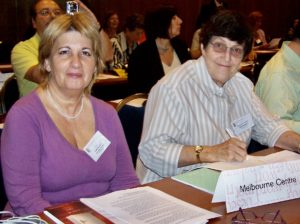
PEN Women Writers Committee Chair Dr. Judith Buckrich and International PEN Board member Judith Rodriguez (Melbourne PEN)
Bishkek PEN did a study highlighting the problem. Central Asian women writers were struggling with poverty, it said, and literature was no longer published unless self-published with limited distribution.
“Women writers are now mostly on their own. They have fallen into a cultural vacuum,” the conference proposal noted. “They are not in contact with colleagues outside their own country and know nothing of the state of culture in the world. In the meantime the global community has begun to pay attention to Central Asia because its difficult geopolitical situation could lead to the rise of violent, ultra-religious and fundamentalist ideologies into the area. And it is partly the lack of modern local literature that makes the region a breeding ground where alien ideologies can take root among young people. Flourishing modern literature could be the means to disseminate democratic ideas and social awareness.”
International PEN raised funds for the conference whose theme was “Women and Censorship.” Women from Kyrgyzstan, Kazakhstan, Turkmenistan and Uzbekistan as well as from Finland, Norway, Switzerland and Australia gathered. The discussion focused on the access to education for women, access to literature and the formation of support groups and publishing cooperatives within and outside the region and ways to overcome censorship and self-censorship. The group addressed external pressures on what women should write and considered ways and means to access funding for women writers.
Attendee Kristin Schnider, President of Swiss German PEN, noted, “Following the discussion on the main topic, women and censorship in Central Asia, I learned just how hard it is for the strong and determined women I met to overcome censorship and self-censorship within their societies…First and foremost a woman is perceived as a mother and wife, tending the family. So much so that women feel they are confronted with the choice between being either creative or getting married. Women are not supposed to enter politics…[and] if women insist on writing they are supposed to stick to detective stories or romantic topics.”
In a discussion “The Situation in Central Asia: Women and Society and Economic Censorship,” moderator and documentary film maker Dalmira Tilepbergenova from Kyrgyzstan, noted: (translated from Russian)
“Patriarchy foundations have always been strong in Asia…My disclosing of gender inequality by the example of cinematograph is not casual. Because firstly cinematograph is a corporative sort of creative work and thus the problem of relations between men and women shows very clear and strikingly there. Second, I as a film director have to constantly deal with the problem of my work. Since Kyrgyzstan became independent, our cinematograph has passed through the period of its clinical death to its reestablishment. New names have already appeared and new films have been shot. But strange relations between our cinematograph and gender policy have existed up to now. Unwillingness of men to see women in the spheres usurped by men occur…instinctively. And this instinct is as strong as the instinct of self-preservation. Firstly, when the woman is engaged on an assisting job position in our cinematograph, everything seems to be all right. But as soon as the woman shows a desire to make films independently, the friendly atmosphere of men around her turns into syndicate of plotters. Men at once start to blame the woman for her excessive ambitions, incompetence, and uselessness. Men also criticize her private life. The woman’s desire to make films is considered as diagnosis of having deficit of sex.”
IPWWC Chair Judy Buckrich of Melbourne PEN reported the Bishkek conference was “a fantastic opportunity,” and said the committee had already begun planning for a meeting of women writers on the African continent to follow the Senegal PEN Congress in 2007. “The meetings are important in expanding the horizons of PEN to women who are not members of PEN but who PEN supports as part of its belief to support writers in difficult circumstances,” she noted.

Women Writers meeting at 2005 PEN Ghana conference including Veronica Uzoigwe (Nigerian PEN), Zeinab Koumanthio Diallo (Guinean Center), Ekbal Baraka (Egyptian PEN), Muthoni Likimani (Kenyan PEN), Kristin Schnider (Swiss German PEN), Caroline McCormick Whitiker (PEN International Executive Director), Jane Spender (PEN International Programs Director), Joanne Leedom-Ackerman (PEN International Secretary/American PEN)
In December 2005 International PEN’s conference in Accra brought together 36 writers, a number of them women, from 13 of PEN’s 17 African Centers to prepare for the 2007 Senegal Congress. Supported by UNESCO and hosted by Ghanaian PEN, the conference aim was to begin developing a plan for sustained programs and collaboration among the African centers and to select a theme for the Congress. While PEN Senegal would act as the host center, the World Congress was a joint effort of PEN’s PAN African Network. African members of the Women’s Committee held an additional meeting to address the challenges facing women writers in Africa and to plan for the larger IPWWC conference in 2007.
In preparing for the Ghana conference, I returned to the shelves of African literature I’d read years before and pulled some of the books which first took me to Africa before I ever arrived on the continent—Ama Ata Aidoo’s No Sweetness Here, Ayi Kwei Armah’s Fragments, Charles Mungoshi’s Waiting for the Rain. In my address to the conference, I included a quote from Ghanaian writer Kofi Anyidoho’s prose poem Akofar only to discover when I arrived that Kofi Anyidoho was on the program.
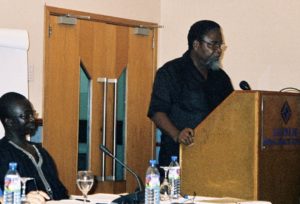
Speaking Ghanaian Professor and poet Kofi Anyidoho, seated Frankie Asare-Donkoh, Secretary PEN Ghana
From Akofar:
Words are birds. They fly so fast too far from the hunter’s aim. Words are winds. Sometimes they breeze gentle upon the smiles our hearts may wear for joy; they fan the sweat away from fever’s brow; they lull our minds to sleep upon the soft breast of earth. Yet soon too soon words become the mad dreams of storms. They howl through caves through joys into shrines of thunderbolts. They leave a ghost on guard at memory’s door. Therefore gently…gent-ly…Akofa, gen-t-ly…Take care what images of life your tongue may carve for show at the carnival of weary souls.”
The poem spoke to the themes and mission of PEN and the gathering of writers who understood that words transport over time and place and history, that words cross borders and have the power to connect us to each other and to ourselves. It is words, shaped into images and ideas, that survive wars and famine and political unrest if we are vigilant and protect them and circulate them and translate them.
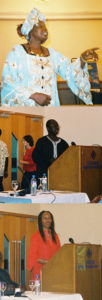
Top to Bottom: Zeinab Koumanthio Diallo (Guinean PEN), Frankie Asare-Donkoh (Ghanaian PEN), Veronica Uzoigwe (Nigerian PEN)
I also quoted from Ghanaian poet Ayi Kwei Armah’s Fragments:
“Where are you going,
go softly.
Nananom,
you who have gone before,
see that this body does not lead him
into snares made for the death of spirits.
You who are going now,
do not let your mind become persuaded
that you walk alone.
There are no humans born alone.
You are a piece of us,
of those gone before
and who will come again.
A piece of us, go
and come a piece of us.
You will not be coming,
when you come,
the way you went away.
You will come stronger,
to make us stronger,
wiser,
to guide us with your wisdom.
Gain much from this going.
Gain the wisdom
to turn your back on the wisdom
of Ananse.
Do not be persuaded you will fill your stomach faster
if you do not have others’ to fill.
There are no humans who walk this earth alone.”
The poem reflected the aspiration of PEN and the meeting among participants who, as writers, often did work alone, yet understood we were all part of a larger community. For any community of letters to thrive and survive, the freedom of the individual writer had to be protected.
At that time in Africa over 230 writers in 34 countries were listed as PEN cases, excluding Egypt, which was counted in the Middle East, though the President of Egyptian PEN also attended the meeting. The large majority of cases were journalists arrested as critics of the authorities or as whistleblowers on corruption. Journalists also ran afoul of the “insult laws” which were on the books in 45 of the 53 African countries. Because of the difficult state of publishing in Africa, journalists were the group of writers with realistic possibilities of being published. Countries of most concern then were the Democratic Republic of Congo, Eritrea, Ethiopia, Gambia, Libya, Somalia, Tunisia and Zimbabwe, none of which had active PEN centers, though a Somali-speaking PEN center did exist in London, and Zimbabwe PEN had existed but was inactive with its President poet Chenjerai Hove having to live in exile. (Today there are PEN centers in Eritrea, Ethiopia, Gambia, and Tunisia though the situation in some of the countries remains problematic.)
The Network of African Freedom of Expression Organizations (NAFEO) had formed just two months before the conference with 33 freedom of expression organizations attending a press freedom conference in Ghana. The aims of the network were similar to PEN’s whose Writers in Prison Committee would interact and assist when the network began to function.
The attendees at the Ghana conference shared experiences of their PEN centers, particularly in providing writing and reading programs in schools. Ghana PEN had a robust program in the schools as did other centers. The delegates agreed that the goals and work of PEN in Africa should include expanding freedom of expression, helping to lower barriers to publishing and disseminating African literature, cultivating new voices and increasing access to literary creation. The means to achieve these goals were part of the discussion, including cultivating new voices by working with youth writing clubs, bolstering recognition and excellence in literature by awarding literary prizes. Delegates planned for these discussions to continue among the African PEN Centers, facilitated when possible by International PEN. They also planned to expand the ideas and work at the 2007 PEN Congress.
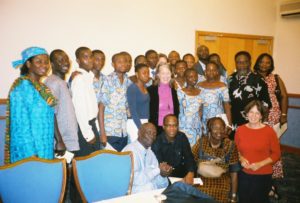
Writers and visiting students at 2005 PEN International Conference in Accra, Ghana. African PEN Centers attending conference: African Writers Abroad, Algeria, Egypt, Ghana, Guinea, Kenya, Malawi, Nigeria, Senegal, Sierra Leone, Somali-Speaking, South Africa, Uganda and Zambia as well as American and Swiss German and International PEN facilitating and note taking.
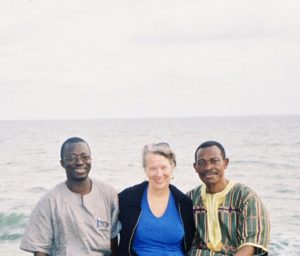
Ghana PEN organizers Frankie Asare-Donkoh, General Secretary and Frank Mackay Anim-Appiah, President with PEN International Secretary Joanne Leedom-Ackerman
During the Ghana conference the possible theme for the 2007 Congress was debated and discussed, including:
—Literature and the Environment/ Literature and Ecology
—Literature and Emancipation (women, political, financial)
—Freedom of Expression and Conflict Prevention
—African Writing in a New Age, In and Out of Africa
—The Role of Literature in the Creation of Peace (with sub-themes “The crisis of reading and readership” and “Literature for children”)
—Writers Role in Peace Building in Africa and World & Literature
—Literature and the Oral Tradition (with the subtheme of the environment)
—The Writer’s /Literature’s Role in Peace-building in Africa and the World
—Literature of Exiles/ Exile Literature
—The Roles of Literature and Publishing
—The Word, the World and Human Values
—Challenge of African Literature Today
—Being a Writer in Africa
—Writer in Age of Globalization (cultural diversity)
—Survival of Literature in New Millennium
—African Writing in New Age: In and out of Africa
—Writers and Prevention of Conflict
—Writers in Their Role in Encouraging and Promoting Literacy in Africa (Responsibility and Role of Writer)
—Literature and Conflict management in Africa and the World
—Freedom of Expression and Global Diversity
—Writers in a World in Crisis (diversity, literacy etc)
The theme finally agreed for the 73rd PEN World Congress in Dakar was: The Word, The World, and Human Values.
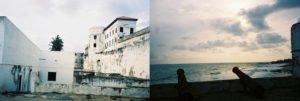
Elmina Castle, built in 1482 as Portuguese trading settlement, became principle holding prison for slave trade on Cape Coast, Ghana for three centuries.
The highlight of the conference was a long road trip to Cape Coast (also known as the Gold Coast), where the first European (Portuguese) explorers arrived in the 1400s. The Portuguese built the Castle of Elmina there which still stands on the rocks above the sea. In this new/old land the Portuguese discovered gold and also began acquiring human beings to trade for European goods. British, Dutch, Danish, Prussian, and Swedish traders soon followed and built other forts along the coast. Elmina Castle was turned into a prison for men and women who were sent shackled through “the door of no return” into slavery. From this point, as well as from Gorée Island off the coast of Dakar, Senegal, the slave trade flourished for centuries as European and other traders sold men and women and goods into the Caribbean and North and South America.
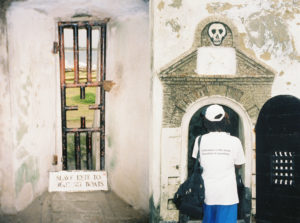
“Slave Exit to Waiting Boats” in Elmina Castle, Cape Coast, Ghana; Kadija George, President of African Writers Abroad Center standing in front of a “door of no return.” The back of her shirt reads: “Literature is the most beautiful of countries.”
The ghostly white fort of Elmina with its iron-barred cells with peep holes to the ocean facing west and the crashing surf on the rocks silenced us as we moved through these portals of history. The several hour ride back to the city was much quieter than our impatient journey to the Coast.
In Tanzania an exchange between poet and audience in the oral and performed poetry often begins:
“I give you a story.”
Audience: “I give you another.”
“I came and I saw.”
Audience: “See so that we may see.”
This power to see and invoke, to enter the rhythm of the human heart and dance there for a time with another as partner is what literature does and what PEN celebrates and tries to protect.
Next Installment: PEN Journey 39: Spiritus Loci—Literature as Home
PEN Journey 37: Bled: The Tower of Babel—Part Two
PEN International celebrates its Centenary in 2021. I’ve been active in PEN for more than 30 years in various positions and now as an International Vice President Emeritus. With memories stirring and file drawers of documents and correspondence bulging, I am a bit of a walking archive and have been asked by PEN International to write down memories. I hope this personal PEN journey will be of interest.
At PEN’s 71st World Congress in June 2005 over 275 writers from 88 PEN Centers gathered from around the world in the idyllic setting of Bled, Slovenia where history had been made 40 years before. In 1965, PEN had held its Congress in Bled, the first in Eastern Europe since the Second World War. Russian writers visited PEN for the first time. At that 33rd World Congress, American playwright Arthur Miller, who’d recently passed away in 2005, had been elected the first and only American President of International PEN.
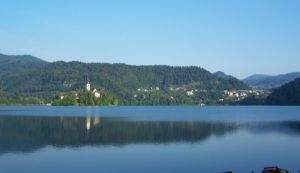
Lake Bled in Bled, Slovenia, site of PEN International’s 71st World Congress, 2005
In 2005 the global dynamics had changed. PEN now had active centers in most of the countries in the former Communist Eastern bloc, including in Russia. The European Union (EU) was in its ascendancy; 2005 marked Slovenia’s accession into the EU. Globalization was bringing benefits but also threats to the cultures of smaller countries.
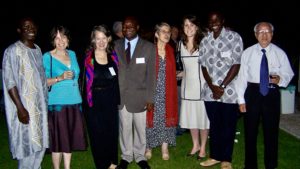
Reception 71st PEN Congress in Bled, 2005. L to R: Frank Asare Donkoh (Ghana PEN), Jane Spender (Program Director PEN International), Joanne Leedom-Ackerman, (PEN International Secretary), Alfred Msadala (Malawi PEN), Cecilia Balcazar (Colombian PEN), Caroline McCormick Whitaker (PEN Executive Director), Dan Khayana (Uganda PEN), Bao Viet Nguyen-Hoang (Suisse Romand PEN) [Photo credit for many photos: Tran Vu]
“We live in an age when many preconceived ideas, nurtured for centuries and ostensibly immutable, are no longer valid,” noted Slovene PEN President Tone Peršak. “The linguistic and cultural image of the world is in flux and civilization as a whole, under the influence of globalization, is taking on a new character. These events are also echoed in discussions within PEN centers…They guided us in our selection of the main topic for discussion at the Congress, namely the issue of linguistic and consequently cultural diversity of the world. The topic is proposed as a question: does linguistic diversity stimulate or hinder cultural development? Is it a curse or a blessing that made possible the emergence and encounter of various world views, different emotional responses to the human destiny, and finally also brought about the formulation of different schools of thought and philosophical doctrines?
“We regard the question of linguistic and cultural diversity also as a human rights issue. Attempts to unify and subject all aspects of life to uniform standards and norms is viewed as a very questionable encroachment on these rights. One of the topics is therefore the question of the need to protect languages and cultures, and that means also the smallest ones which may be on the verge of extinction. Let us also draw your attention to literature’s role in the preservation of the memory of the cultural landscape, which has been undergoing considerable changes and in some cases may even disappear forever…[Is] literature a kind of lingua franca which could and should contribute to a better mutual understanding and insight into the different cultures and nations that sustain cultural diversity?”
These were questions without definitive answers, but questions that occupied writers from dozens of cultures and languages in the Congress’s literary sessions. [At PEN Congresses, the main sessions and the Assembly of Delegates were usually translated into PEN’s three official languages—English, French and Spanish—and also the language of the Congress host.]
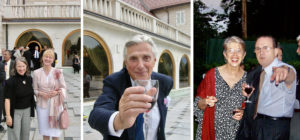
PEN International Congress Bled, Slovenia 2005. L to R: Joanne Leedom-Ackerman (PEN International Secretary), Monika Van Paemel (Belgium (Dutch-speaking) PEN), Alexander Blokh (French PEN and former PEN International Secretary), Cecilia Balcazar (Colombian PEN), Jiří Gruša (President, International PEN)
A number of the delegates had before been to Bled, home of PEN International’s annual Writers for Peace Committee conference, hosted by Slovene PEN. During the Cold War the Peace Committee, founded in 1984, provided one of the only open forums for dialogue between writers from the East and West.
“Let us learn the language of our neighbors so that we all may better come to know and understand our neighbors and forestall incomprehension and conflict,” the Peace Committee and the Congress organizers urged.
In my own address to the Congress as International Secretary, I relied on the prevailing metaphor of the bridge, using an example close to home:
I recently crossed a soaring new bridge in Boston, Massachusetts, a bridge at least 14-years in the making. This bridge spanning the Charles River was the result of what is called the Big Dig, a project anyone who has lived in or regularly visited Boston has come to think of as the Eternal Dig for it is hard to remember when a large segment of downtown wasn’t under construction. But at last there is this soaring bridge with stanchions into the sky in gracious arcs and at night a blue light shining up into its cables as it rises above the city. There is also an elaborate network of freeways and tunnels underground.
I sometimes think International PEN is a bit like the Big Dig. For much of the last decade we’ve been reconstructing ourselves, trying to reflect in our governing structures the expansion that PEN has experienced across the globe, an expansion brought on in part by the opening up of societies after the fall of the Berlin Wall and the lifting of the so-called Iron Curtain. This expansion has also been enabled by the linking of the globe through the internet. International PEN has instituted a Board, been through a long range planning process, revised rules and regulations, and while we still have construction going on and probably always will, I’m hopeful that we too will start to see more and more of the benefits of all this work…Throughout we’ve continued to witness remarkable activities from our Centers…
This year I’ve been telling people that PEN is a place where cultures don’t clash but communicate. PEN members may not always agree, in fact frequently don’t agree, but the fellowship among members can keep that disagreement from turning into confrontation. At our best PEN’s forums offer a place where the energy of competing ideas releases light, rather like that spectacular blue light which shoots upwards on the cables of the grand bridge in Boston.
Arthur Miller once described PEN: “With all its flounderings and failings and mistaken acts, it is still, I think, a fellowship moved by the hope that one day the work it tries and often manages to do will no longer be necessary. Needless to add, we shall need extraordinarily long lives to see that noble day. Meanwhile we have PEN, this fellowship bequeathed on us by several generations of writers for whom their own success and fame were simply not enough.”
The work included substance and form, the latter focusing on the organizational structure which allowed the work to go forward. At the Bled Congress the delegates approved procedural reforms, broke into workshops to discuss PEN itself and global and regional issues, and were introduced to PEN’s first Executive Director, who would begin the following month. After an extensive search, the board and staff had agreed to hire Caroline Whitaker (née McCormick) who had worked in theater development, had a degree in literature and was coming to PEN from the Natural History Museum where she was Director of Development.

Writers in Prison Committee and Workshop Sessions, PEN International Congress, Bled, Slovenia, June 2005
At the Congress seven candidates from Algeria, Colombia, Croatia, France, Finland, Japan, and Russia ran for positions on the International Board, and Mohamed Magani (Algerian PEN), Sibila Petlevski (Croatian PEN), Sylvestre Clancier (French PEN), and Takeaki Hori (Japan PEN) were elected.
The Congress discussed and passed over 20 resolutions and actions challenging the situations for writers in Algeria, Basque region of Spain, Belarus, Burma, China, Cuba, Iran, Maldives, Mexico, Nepal, Russia, Syria, Tibet, Uzbekistan, and Vietnam as well as resolutions relating to the attacks on journalists in war zones and the crackdown on internet writing in Tunisia where the World Summit on the Information Society was to be held that fall.
The Congress also noted the tenth anniversary of the death of PEN member Nigerian writer Ken Saro-Wiwa. International PEN President Jiří Gruša noted: “We are living in a time of extraordinary threats to writers and the freedom to write. In the ten years since our colleague Ken Saro-Wiwa was executed in Nigeria, hundreds of writers and journalists around the world have died by violence. Crackdowns on internet writers and anti-terrorism legislation have named writers and chilled freedom of expression in a number of countries.
“While our colleagues in countries such as Myanmar, Cuba, China and Belarus continue to struggle against conventional governmental censorship and repression, writers also face the threat of moral violence in countries from Mexico to Iraq and new pressures associated with writing and publishing on the internet.”
Among the guests at the Congress were Colin Channer, who introduced the prospective Jamaica PEN Center which was voted into PEN at the subsequent 2006 Congress in Berlin.
And for the first time since the Tiananmen Square massacre June 4, 1989, a writer from the People’s Republic of China attended as a representative of the new Independent Chinese PEN Center whose members included writers from inside and outside of mainland China. I include below much of his talk which rings truer than ever.
Wang Yi* addressed the Assembly, noting that this was the first time in 16 years “the voice of a non-official and independent Chinese writers’ group could be heard, a group that is independent or at least strives for its independence, that is free or at least longs for freedom and that tries to perpetuate the freedom of expression in the face of great political pressure…
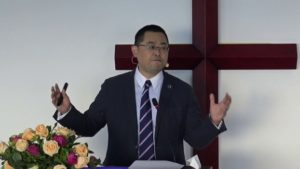
Wang Yi (Independent Chinese PEN Center)
“I come here heavy-hearted without blessing, because there is no reconciliation between a free writer, an independent intellectual, and his government. I come to Bled representing those who have been disgraced, who have stood in the shadow of terror and the peril of political oppression, and who have yet never resigned but have insisted upon their freedom of speech and writing, such as Mr. Liu Xiaobo whose work has been not allowed to be published and who has not been allowed to go abroad. I also come for myself, who experienced in the sixteen years after Tiananmen a long period during which memories have been erased forcefully and silence has been ordered. This has been a time during which mothers, who lost their sons and daughters at Tiananmen, have not been allowed to weep…
“To me and my colleagues, writing is a rescue plan for the hostage. Writing means dignity and freedom; it is kind of belief. But we cannot rescue ourselves, even when we have courage and when justice is on our side in the face of institutional arbitrariness…
“Our salvation depends upon that higher community, depends upon common universal values that we share as writers, as free people and as intellectuals. It is the source of liberty and imagination…
“We are disappointed to see that some European governments are gradually abandoning free values and lessening their criticism of the despotic regime in Beijing. For a common benefit they abandon the writers, reporters, dissidents and orators who are imprisoned…
“According to the Independent Chinese PEN club, more than 50 writers and reporters are currently in jail…
“I want to mention two points: the first one is the belief that through writing, we can enlighten and preserve basic human values. Second, there is a global realistic linguistic environment. These two points make me think that the persecution of Chinese, Tibetan, Uighur and other minority writers reaches across borders to become an international issue…There is only the suppression of the right to freedom of expression and the persecution of human beings, which needs to be rooted out, and the victim needs to be consoled and supported…
“The Chinese government’s suppression of writers has accelerated in recent years, since the beginning of the Internet era…pen names and pseudonyms are prohibited. With this act, the last bastion of self-protection is destroyed.
“Every morning, the Communist Party’s propaganda department issues a list of prohibited news to the media. Whoever dares to break the taboos will get into big trouble. As the government stifles the mouths of the media and betrays the public, it also tampers with the truth in historical textbooks and deceives the children in school. An increasing number of courageous writers, reporters and public figures are daring to challenge the status quo so more and more of them have been thrown into jail on charges of committing the crime of “instigation and subversion of the state” or “disclosing state secrets” to “hostile forces…
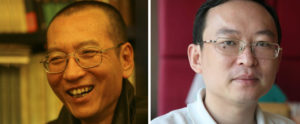
Liu Xiaobo and Yu Jie (Independent Chinese PEN Center)
“Among the harassed and persecuted are also the president of ICPC and his deputy, Mr. Liu Xiaobo* and Mr. Yu Jie*. Under such circumstances, you cannot but regard the Chinese writer as a hostage…
“I come to Bled hoping to present myself as a writer, but I am indeed only a hostage…One of the reasons that I definitely wanted to come is that I believe we all belong to the same world. In this world, the state, the glory and the lawful right all belong to that higher spiritual origin that makes us, without regret, proud to be a writer.”
*[Wang Yi, deputy Secretary General of ICPC 2003-2007, has been imprisoned in China since December 2018, serving a 9-year sentence for “activities disobedient to the government control” and “inciting subversion of state power and illegal business.” Wang Yi is a writer and a Christian pastor. Liu Xiaobo, the second President of ICPC, was sentenced in December 2008 to an 11-year prison sentence as “an enemy of the state” for “incitement of subverting state power.” He was the first Chinese citizen to win the Nobel Prize for Peace in 2010 and died in custody June 13, 2017. Yu Jie, a celebrated writer, was one of the drafters, along with Liu Xiaobo, of Charter 08, which set out a democratic vision for China; he was arrested and tortured in 2010 and immigrated to the U.S. in 2012. He is author of Steel Gate to Freedom: The Life of Liu Xiaobo.]

Lake Bled, Slovenia, site of PEN International 71st World Congress, 2005
Next Installment: PEN Journey 38: PEN’s Work On the Road in Kyrgyzstan and Ghana
PEN Journey 36: Bled: The Tower of Babel—Part One
PEN International celebrates its Centenary in 2021. I’ve been active in PEN for more than 30 years in various positions and now as an International Vice President Emeritus. With memories stirring and file drawers of documents and correspondence bulging, I am a bit of a walking archive and have been asked by PEN International to write down memories. I hope this personal PEN journey will be of interest.
In pulling out papers from 2005 of PEN conferences and the 71st World Congress, I came across two documents that told a very human story in PEN and a coincidence of life that I share here:
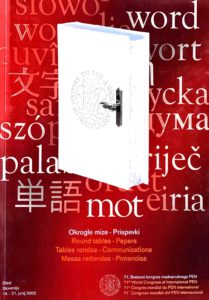
71st PEN World Congress 2005, Bled, Slovenia, Round Table Papers
The first paper I skimmed was a talk I’d given as PEN International Secretary at the Translation and Linguistic Rights Committee Conference in Ohrid, Macedonia in September 2005; the paper included the testimony of a PEN member at the end. The second text I read was from the Round Table Papers of the PEN Congress a few months before, in June 2005. This paper was on the Congress theme Tower of Babel: Blessing or a Curse? The paper was the first in that publication and was written by celebrated Nigerian poet Niyi Osundare who speculated on what the world would be should there be just one language and then meditated on what in fact the world was. Shared below are excerpts from Dr. Osundare’s paper, “The Blight and Blessing of Babel:”
“A one-language world would be too simple, too linguistically neat, too unrealistic. And, I daresay, too unnatural. For everywhere in nature there is a tendency towards fission and mutation on an intra-and inter-generic basis. Variety is not only the sauce of life; it is also its source…
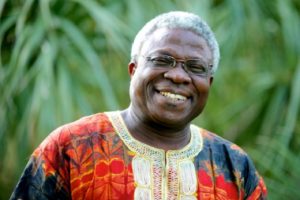
Nigerian poet Dr. Niyi Osundare
“Yoruba culture (the culture in which I was born and raised, and one that I know best) understands the necessity of diversity and inevitability of varieties in different aspects of human life. Hence the saying “Mee l’Oluwa wi” (Many, says the Lord) and “Ona kan o w’oja” (There are countless routes to the same market), both of them short, handy variations on a longer proverb “Oju orun t/egberun eye fo lai farakanra (The sky is wide enough for a thousand birds to fly without colliding). Corroborating this pluralist perspective is the folktale about the Tortoise, ever cunning and self-centered, who one day decided to capture all the wisdom in the world and seal it up in one pot for his own use in an effort to become the wisest being in the world. Of course, his project ended up in a laughable disaster as his pot fell to the ground and exploded while different fragments of the imprisoned wisdom dispersed in different directions, free for all, unmonopolisable. In an essentially pluralist Yoruba worldview, phenomena exist by mutual definition; a thing, a person loses its sense of proportion when there is nothing else to compare it with. The trajectory of life hardly ever follows one straight and narrow path; it must confront the crossroads, experience the thrills and tortures of decision and indecision, before arriving at the juncture of choice. And for the act of choosing to take place, there must be more than one…
“Literature (and the arts generally) is, no doubt, a powerful weapon in the struggle against the blight of Babel. By endowing our airy thought with that ‘little habitation’ and ‘name’ (hail Shakespeare, one of the supreme healers of the wounds of Babel), by generating universal sympathies, globalizing the particular and particularizing the global, by producing that music of the spheres whose winds stir the eaves in different lands, by evoking images which touch hearts across cultures, by articulating those humane values that are essential to human freedom everywhere in the world, by constantly lifting the human spirit and enriching, interrogating human reality with the supple possibilities of fiction…literature strives to restore some of the lost potentialities of Babel. For every significant writer is a bridge-builder of a kind, a witness, a participant-observer, an advocate of a truly humane future.
“No doubt, the phenomenon of Babel has left its fragmentations and dispersals. But it has also bequeathed to humanity a panoply of sounds and letters, an astounding (even if confounding) array of tongues which challenges the tyranny of uniformity and monotony of methods. It has necessitated the building of bridges across diverse tongues and cultures, these bridges being, in a way, a horizontal alternative and antidote to the vertical impossibility of the Tower itself.”
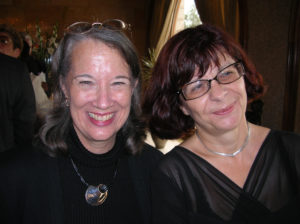
L to R: Joanne Leedom-Ackerman (PEN International Secretary) and Kata Kulavkova (Chair PEN Translation and Linguistic Rights Committee)
Dr. Niyi Osundare, a Nigerian PEN member, had moved to New Orleans for specialized education for one of his daughters and was also a member of the African Writers Abroad PEN Center. Recounted here is my talk to the Translation and Linguistic Rights Committee a few months after the Bled Congress, in September 2005. Only as I recently read the end of my paper did I grasp the connections and the range of PEN’s reach and work. My observations at the time:
The theme of the 8th Ohrid P.E.N. Conference—Writer Within and Without a Homeland—struck a particularly sonorous chord as I was preparing to come here.
In the U.S. the question of homeland has been on the national consciousness for the past month as one of America’s most diverse and multi-lingual cities—New Orleans—has literally disappeared. Its population evacuated as the city sank into the waters of the Gulf of Mexico. A large portion of the Gulf coast also fled in the face of Hurricane Katrina. Over a million people dispersed throughout the land in one of the largest displacements in the nation’s history. Many will never return to their homes.
In Europe and Africa, Asia and Latin America even larger displacements have occurred in the last century, often because of war, famine, politics, and also weather. All of us remember the disappearance of towns and villages and whole sections of coasts in the countries hit by the tsunami last December.
When a home is suddenly gone, family scattered, livelihood and career and ambitions all uprooted, one is forced to consider what endures, and what one can take with him. Home moves from a physical place to a place in consciousness.
The ability to speak with others and to tell the story is especially important and makes the idea of language as homeland compelling, also imagination as homeland, literature and art as homeland, and particularly relevant to PEN, a community of fellowship as homeland.
I’d like to read a message to PEN’s Africa Writers Abroad Centre from a Nigerian writer trapped in New Orleans:
This is my first real internet access since the disaster struck…I can’t thank you enough for your concern and care. It’s been all so overwhelming. My wife and I are alive and, after passing through five horrendous “evacuation centers”, have been allocated to the Red Cross shelter in Birmingham, Alabama. The nightmare of the past seven days is simply unimaginable. We very narrowly escaped drowning in our own house. Pursued by an 8-foot high toxic flood water (15 feet in the street outside our door), we were forced up a stuffy, airless attic, where we were holed up for 26 hours, with no food, no water, no prospect of any rescue. We were only saved by the fortuitous intervention of a neighbor who heard our shout for help when he came round with his rescue boat to pick up something from his own house. With life vests provided by him, we managed to swim out of our house, leaving everything we had behind. Right now, all our clothes, books, academic and professional credentials, travel documents, computers, manuscripts, etc are submerged in the dirty waters of the New Orleans flood. Hell has no other name… We deeply appreciate your concern. Kindly pass on our gratitude to all on your list serve.
Yours in the Eye of the Storm
[Niyi Osundare]
I’m told he has been overwhelmed by the outpouring of concern. While the concern and offers of assistance can’t replace what was lost, it can fill in some of the spaces in the heart.
In the U.S. those displaced are at least relocated in the same country and for the most part speak the same language, though the difference in accents has its challenges. What has been heartening has not been the help of government agencies, but the outpouring of citizens in communities all over the nation and abroad. One would wish this empathy would prevail and continue.
The ability to imagine and to reach out to another and try to see from the other’s point of view is one of the elements of great literature and also of great people. This empathy is a value around which PEN has developed and one which PEN at its best embodies.
A community spread across 99 countries, shaped by different nationalities, cultures, races, religions, and languages, PEN is a fellowship of writers who appreciate the importance of telling a story and defend the writer’s freedom to tell it as he sees it and to tell it in the language of his choosing. Language is the writer’s tool, expressing the music of his thoughts and sounding the chords of his imagination.
Language, imagination and fellowship—all are a kind of homeland that can survive the elements and can even survive politics and war, a homeland, one of whose addresses we like to think is at P.E.N.
Dr. Osundare and I didn’t know each other at the time though perhaps met briefly at the Bled Congress which was attended by more than 275 writers. I know many of his colleagues from Nigerian PEN and at the time from the African Writers Abroad PEN. I made the connection only as I reviewed the papers. Dr. Osundare is now a professor at the University of New Orleans.
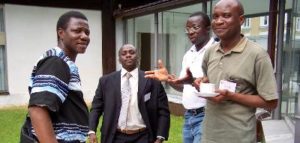
Delegates at PEN International World Congress, Bled, Slovenia, June, 2005. L to R: Remi Raj (PEN Nigeria), Dan Kayhana (PEN Uganda), Frankie Asare Donkoh (PEN Ghana), Alfred Msadala (PEN Malawi)
Next Installment: PEN Journey 37: Bled: The Tower of Babel—Part Two
PEN Journey 35: Turkey Again: Global Right to Free Expression
PEN International celebrates its Centenary in 2021. I’ve been active in PEN for more than 30 years in various positions and now as an International Vice President Emeritus. With memories stirring and file drawers of documents and correspondence bulging, I am a bit of a walking archive and have been asked by PEN International to write down memories. I hope this personal PEN journey will be of interest.
PEN’s work attests to the power of the individual and also to a particular vision of globalization that advocates the global right to free expression, a right that supersedes national restrictions.
In February 2005 Orhan Pamuk, one of Turkey’s most noted writers, received threats and had his books burned by nationalist groups objecting to comments he made to a Swiss magazine while he was abroad. He referred to an Armenian “genocide.” While the Armenian community rallied to defend him, their support heightened certain nationalists’ protest in Turkey. Orhan wasn’t in Turkey at the time and hoped the turmoil would die down, but a government official in southern Turkey ordered the seizing of his books from local libraries so that they could be destroyed; it turned out later that there were none of his books in those libraries.
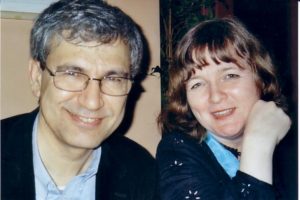
Novelist Orhan Pamuk and Sara Whyatt, International PEN Director of Writers in Prison Committee (Photo credit: Sara Whyatt)
At Pamuk’s request International PEN kept quiet publicly at first. In mid-April Sara Whyatt, International PEN’s Director of the Writers in Prison Committee (WiPC) and I had lunch with Orhan in London to discuss how PEN could help if the threat escalated. I was International Secretary of PEN at the time. We agreed that publicity at this stage could exacerbate the situation; however, we explained that PEN centers could work behind the scenes by direct contacts with their governments, and PEN would be prepared to step into public action should the need arise.
Pamuk intended to stay outside Turkey until late April/early May, but then he would be returning home to Istanbul. Sara stayed in touch with him and shared a plan for action if the threats resumed on his return. Meanwhile we told him PEN would continue to lobby for a change in the Turkish Penal Code that allowed the charges. Key PEN centers, who had good relations with their own governments, and centers from countries with influence in Turkey would make approaches. London’s WiPC would make similar approaches to Turkish officials in Ankara and also through mechanisms at the United Nations, OSCE, and the European Union (EU). At the time Turkey was hoping to become a member of the EU and was attempting to align its judiciary codes with those required by the EU. PEN also worked with the International Publishers Association .
PEN prepared a statement on the situation in Turkey from early 2005 and kept it updated with news and recommended actions for the over dozen PEN centers ready to respond on this case. There was also press guidance should the centers receive queries. Meanwhile PEN continued to work on the other cases of over 70 writers and intellectuals charged or in prison in Turkey, which had long been a country with a revolving door of writers harassed, detained, attacked and sent to prison.
On April 1, 2005 World Peace Day the Turkish press reported:
The investigation against author Orhan Pamuk due to this statement saying, ‘One million Armenians and 30,000 Kurds were killed’ [in Turkey] has ended with a case in which he is accused of violating article 301 of the new Penal Code (same as famous article 159 in the former one) “Insulting Turkish nationality” and with the demand of being imprisoned between six months and three years. The first hearing will take place at Istanbul Sisli No. 2 First Instant Criminal Court on December 16, 2005.
The Public Prosecutor claimed that Pamuk’s remarks in Switzerland’s Das Magazin were an infringement of Article 301/1 of the Turkish Penal Code which states that “the public denigration of Turkish identity” is a crime and that those found guilty should be given sentences ranging from 6-36 months.
With threats renewed by the Public Prosecutor and a lawsuit filed against Pamuk that could result in a three-year prison term, Orhan finally gave PEN the green light to launch its campaign. PEN centers mobilized globally, including in Turkey.
“It is a disturbing development when an official of the government brings criminal charges against a writer for a statement made in another country, a country where freedom of expression is allowed and protected by law,” I noted at the time.
Pamuk’s hearing in December, 2005 was approximately ten years after renowned Turkish writer Yaşar Kemal had been called to trial on similar charges in January 1995. Pamuk told a colleague he would underline two things in his statement:
1. What I said is not an insult, but the truth.
2. What if I were wrong? Right or wrong, do not people have the right to express their ideas peacefully in this Turkey?
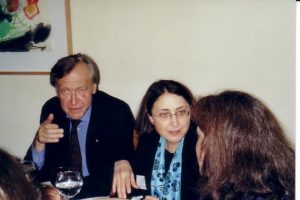
Eugene Schoulgin, PEN International Board Member and Müge Sökmen (Turkish PEN) at WiPC Conference, Istanbul, 2006 (Photo credit: Sara Whyatt)
At the judicial hearing, PEN members came to stand witness to the proceedings, including WiPC Chair Karin Clark, Turkish PEN President Vecdi Sayar, and International PEN board member and former WiPC Chair Eugene Schoulgin. Armored police officers escorted Orhan as protesters hurled a barrage of eggs and jumped on the car, punching the windshield.
PEN’s observers reported at the time: “The scenes around the first appearance of Orhan Pamuk before Sisli No. 2 Court of First Instance on 16 December 2005 at 11:00 were marked by constant shouting and scuffling turning ugly and violent at times. As those attending the proceedings left the court, eggs were hurled along with insults from the nationalists and fascists among the crowd lining the pavement across the street. This in full sight of the national and international media which had turned out in full…
“The courtroom was packed with well over 70 people—among them famous Turkish writers such as Yaşar Kemal and Arif Damar, and representatives of the European Parliament, several diplomats, members of Turkish and international freedom of speech organizations. The aggression and heckling inside and outside the court did not abate…”
The session ended after an hour and 15 minutes with an adjournment because the Ministry of Justice said that it needed more time to decide on the legal basis of the trial.
Hearing the news of postponement, International PEN President Jiří Gruša declared, “It is unbelievable that Orhan Pamuk, one of Turkey’s best known and eminent authors, is in this situation. What it indicates is a complete disregard for the right to freedom of expression not only for Pamuk, but also for the Turkish populace as a whole. This decision bodes ill for other writers who are being tried under similar laws.”
He added, “PEN demands that the trials against all writers, publishers and journalists be halted and that the laws under which they are being tried be removed from the Penal Code. We also call on the Turkish authorities to put a definitive end to the penalization of those who exercise their right to freedom of expression.”
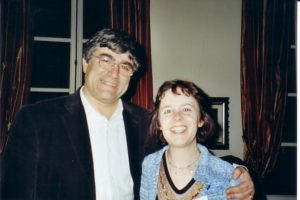
Hrant Dink, Journalist and Editor-in-chief Argos and Hilde Keteleer (Belgian Flemish PEN) at PEN WiPC Conference in Istanbul, Spring 2006 (Photo credit: Sara Whyatt)
At the time there were 14 other writers, publishers and journalists on trial under the newly revised “insult” law for criticizing the Turkish state and its officials. These included Ragip Zarakolu, publisher of books by Armenian authors and Hrant Dink, editor of an Armenian language newspaper, who was assassinated two years later.
For Pamuk the charges were dropped in January 2006, though on a technicality rather than on legal grounds protecting freedom of expression. The widespread opposition to Pamuk’s prosecution by PEN and other organizations succeeded, but as Turkish PEN President Vecdi Sayar noted in The New York Times: “There are many people abroad who fail to see beyond Orhan Pamuk’s trial. Saving a writer like Orhan Pamuk from prosecution may stand as a symbolic example on its own. But it is not an overall resolution for other intellectuals and writers that still face similar charges in Turkey.”
In March 2006 Orhan was the featured guest at PEN International’s Writers in Prison Committee’s biennial conference held in Istanbul, hosted by Turkish PEN.
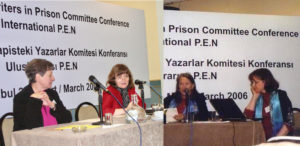
Writers in Prison Conference Istanbul 2006. L to R: Karin Clark (International PEN Chair WiPC), Sara Whyatt (Director WiPC), Joanne Leedom-Ackerman (International Secretary International PEN), and Sara Wyatt (Photo credit: Sara Whyatt)
On October 12, 2006 Orhan Pamuk won the Nobel Prize for Literature.
It could be said that the case of Orhan Pamuk signaled a long ride to the end of Turkey’s potential membership in the EU. In September 2006 the European Parliament called for the abolition of laws such as Article 301 “which threaten Europe’s free speech norms.” In 2008, the law was reformed, but according to the reform, it remained a crime to explicitly insult the “Turkish nation” rather than “Turkishness,” and in order to open a court case based on Article 301, a prosecutor was required to have approval of the Justice Minister; a maximum punishment was reduced to two years in jail. In November 2016 the members of the European Parliament voted to suspend negotiations with Turkey over human rights and rule of law concerns. In February 2019 the European Union Parliament committee voted to suspend accession talks with Turkey.
Turkey continues to be one of the most problematic countries for writers, especially on certain topics. While Turkey’s Penal Code relaxed for a while, allowing more space and freedom for writers, in the last years, the code and its execution has grown more onerous than ever.
*****
In that spring of 2005, I attended an event celebrating Press Freedom Day (May 3), hosted by Italian PEN in Venice. There I shared testimonials from writers on whose behalf PEN had worked. I share these again here:
** Cuban journalist and poet Jorge Olivera Castillo was conditionally released from prison in December 2004 after serving 20 months of an 18-year sentence. He wrote:
Your solidarity has been a light in the darkness. Thank you for having elected me as an Honorary Member…[I send] to all of you my gratitude for your messages of support and your unflagging concern.
** Nkwazi Mhango, Tanzanian journalist in exile, wrote:
Believe it or not tears are gushing as I am writing this message. No way in whatsoever manner my family and I can reciprocate your love and commitment to our plight. THANKS AGAIN AND AGAIN AND AGAIN MORE.
** On a sadder note the following was received from Tunisian internet writer Zouhair Yahyaoui, who died suddenly in March 2005 from a heart attack after he’d been released from prison:
Your email gave me once again a lot of hope for a better future in my country at a time when the dictatorship uses all illegal and barbaric means to make us give up and abandon all forms of protest…The fact that I continue to struggle to obtain our right to freedom of expression, here in Tunisia, is thanks to support of members of International PEN and other international organizations. Thank you again to you, to the Writers in Prison committee of International PEN and to all the PEN clubs all over the world who have supported me enormously during my imprisonment and who continue to do so.
** And from Chinese writer Jiang Qisheng:
… I am not a remarkable person. I am just an ordinary guy who did something extraordinary because it was the right thing to do…If my own case has any special significance it is only that it forces people to face a highly embarrassing fact—the fact that even now, in the dawn of the 21st century, a Chinese citizen can be imprisoned for what he says.
** I ended with a passage from the book This Prison Where I Live, the collection of prison writings drawn together by International PEN’s Writers in Prison Committee. In the afterword Malawian poet Jack Mapanje, who himself was in prison during the autocratic rule in his country, tells how bits of news managed to get smuggled into him in his concrete cell filled with spiders and cockroaches, scorpions and bats and bat droppings.
I found the note, unusually fat…I found a bulletin of typed world news and two poems by Brecht…Pat also enclosed two honorary membership cards from International PEN’s English and American centers, issued in London and New York respectively. They each bore my name. I had been made a member of PEN. Well, well, well!…
Then there was a cutting from Britain’s Guardian newspaper. Lord Almighty! A picture of Ronald Harwood, Harold Pinter, Antonia Fraser, and other members of English PEN reading from my book of poems in protest at the Malawi High Commission in London! It must sure have an effect, I thought. Ten thousand miles away, among the cockroaches of the prison where I lived I felt utterly humbled. Shattered. Such generosity, such warmth I surely did not deserve. All for one slim volume of poems? Why hadn’t I written more poems? I was dumbstruck. Despair vanquished. ‘I am belonged,’ I heard myself whisper.
Next Installment: PEN Journey 36: Bled: The Tower of Babel—Part One
PEN Journey 34: Diyarbakir and Beyond—Finding Byways for Peace
PEN International celebrates its Centenary in 2021. I’ve been active in PEN for more than 30 years in various positions and now as an International Vice President Emeritus. With memories stirring and file drawers of documents and correspondence bulging, I am a bit of a walking archive and have been asked by PEN International to write down memories. I hope this personal PEN journey will be of interest.
PEN has always been about building bridges, finding the byways of fellowship among writers whose currency is language and imagination and whose hope is that even with radically different histories and backgrounds, writers might find a way to sit down across a table from each other and share stories and listen to each other and thereby have a beneficent influence on the way they and their societies see themselves and others.
It is an idealistic goal that has been battered in PEN’s hundred year history, and yet the organization continues; the dialogues continue, and writers from over 100 countries continue to meet and talk, even from countries whose governments have not found peace in decades. There have been moments of seeing that optimism realized, at least for a time, and also seeing it smashed.
The next section of these PEN Journeys covering the years 2004 (PEN Journey 33) through 2007 (August) will focus on my years as International Secretary of PEN International. I will travel through events chronologically, the number of events increasing considerably as the role demanded. I will try to knit these together as we continually try to do as an organization.
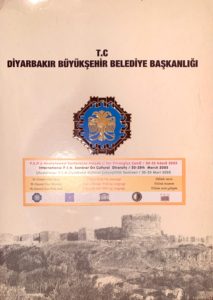
International PEN Seminar on Cultural Diversity in Diyarbakir, Turkey, March 2005
In January, 2005 we held our first board meeting of the year in Vienna where PEN President Jiří Gruša had recently taken up the position as Director of the Diplomatic Academy of Vienna which hosted us. The formal board meeting itself took place in the basement of the hotel restaurant where we were staying. Around the table in the cozy space where we sat on chairs and on a long booth was PEN’s diverse board from Algeria, Colombia, France, USA, Czech Republic, Denmark, Finland, Croatia, Australia, Norway and Japan. The search for an executive director, the new financial and employment systems going into place in the office, an upcoming meeting in Stavanger, Norway with the old Cities of Asylum Network, and an upcoming meeting in Diyarbakir, Turkey with Kurdish and Turkish PEN—all populated the agenda as did the omnipresent discussions on fundraising.
For me, the imminent departure of my Marine son from the combat zone in Iraq hovered in the corner of my mind. We were staying at a pension hotel with small rooms—single bed, dresser and nightstand; I could almost touch the walls on both sides. Outside it was snowing. I’d come to Vienna unprepared for the snow and had bought at a sale a large puffy yellow coat that now draped across the bed for warmth. At night in the dark as I fell asleep, I thought about my son and one night dreamed a desperate dream. Then the phone rang; it was 1:30 in the morning. My husband’s voice woke me. “Wheels are up!” he declared. “They are on their way home!” I still remember the moment, lying there in the dark, snow glistening in the light through the small window and feeling as though the walls had suddenly expanded and a weight lifted that I hadn’t been fully aware I was carrying. The memory…the snow, the Cathedral we passed each day in the square and at dusk in the evening, the puffy yellow coat…
I was wearing that same coat as snow fell later that month in Washington, DC the day my son finally pulled into our driveway. I was sitting on the front porch swing in the snow waiting for him, thinking about the hotel room in the dark, the restaurant basement where we helped craft a conference for writers from the hostile parties in Turkey and another to find sanctuary for writers fleeing oppression—all these memories are wrapped together in a moment of return and of the spirit lifting and life opening a corridor to walk down.
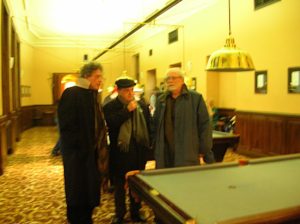
Czech PEN 80th Anniversary in Louvre Cafe where PEN members met in 1925. L to R: Playwright Tom Stoppard, PEN Int’l President Jiří Gruša, Czech PEN President Jiří Stránský.
The next meeting I attended that winter on February 15, 2005 celebrated the 80-year anniversary of Czech PEN. In Prague Jiří and I toasted the endurance of his PEN Center which had been founded by Karel Čapek and 37 Czech writers on that day in 1925. Czech PEN had survived the Second World War, the Cold War, the Soviet occupation and finally the liberation. Former prisoner, playwright and PEN member Václav Havel had become President of the country and his good friend and also prisoner Jiří Gruša was now President of International PEN. Under the auspices of the Minister of Culture, we met with Havel and playwright Tom Stoppard, himself Czech, and Jiří Stránský, President of Czech PEN at the Louvre Café where the original PEN gathering had taken place. Later, the Mayor of Prague hosted a reception with Czech PEN members in the Old Town Hall where he opened an exhibition celebrating “Eighty Years of the Czech PEN Club.”
The following week Writers in Prison Director (WIPC) Sara Whyatt and I traveled to the city of Stavanger, Norway which sat on the sea with a harbor and ships at dock. The Stavanger meeting brought together PEN and members of the now disbanded International Parliament of Writers, an organization founded after the fatwa against Salman Rushdie. The Parliament of Writers had developed a program to house writers in cities of asylum, but the Parliament of Writers no longer functioned. Many of the cities, however, still wanted to continue their hospitality for writers at risk. Stavanger itself hosted writers, including poet and novelist Chenjerai Hove, who’d been president of Zimbabwe PEN until he’d had to flee the government of Robert Mugabe. Hove was a fellow at the House of Culture in Stavanger until he passed away in 2015.
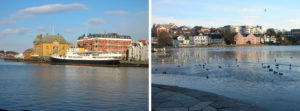
Stavanger, Norway, February, 2005 setting for birth of International Cities of Refuge Network (ICORN)
Helge Lunde, director of the Stavanger International Festival of Literature and Freedom of Speech convened PEN, representatives from the old Parliament of Writers and representatives from some of the cities that wanted to continue the program. In a several day meeting, the outlines of what would become the International Cities of Refuge Network (ICORN) were laid down with PEN as the vetting organization for applications and also a source of hospitality when writers arrived in their new temporary homes. ICORN remains active today in partnership with PEN in over 70 cities which promote and protect freedom of expression and host writers and artists at risk by providing housing, an income, literary arenas, scholarships and grants. PEN’s Writers in Prison Committee and ICORN regularly hold biennial meetings together.
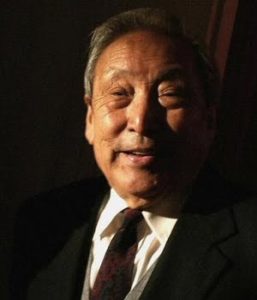
Writer Liu Binyan, a founder and first President, Independent Chinese PEN Center
The following weekend at Princeton University the relatively new Independent Chinese PEN Center (ICPC), founded in 2001, honored Liu Binyan, one of its founders and first President. ICPC’s members live both in China and abroad. The PEN Center gave them the ability to talk with each other and hold programs together, often in Hong Kong. Because of his writing and criticism of the Chinese Communist Party, especially after Tiananmen Square, Liu Binyan had not been allowed to return to China after an academic stay in the U.S. Though he never saw China again, in the U.S. he wrote and worked as Director of Princeton University’s China Initiative. (Nobel Laureate Liu Xiaobo was also a founder of ICPC and its second president.) At the dinner at the Princeton Faculty Club, ICPC members and China scholars presented Liu Binyan the book Living in Exile, written by distinguished essayists in China and abroad and dedicated to Liu who had spent considerable time in detention and in and out of labor camps. Later that year Liu Binyan passed away at his home in New Jersey.
In March “The International PEN Diyarbakir Seminar on Cultural Diversity” convened the largest and most ambitious conference that quarter in the primarily Kurdish southeast of Turkey. For years the Writers in Prison Committee had focused on cases in this dangerous region where fighting between the Kurdistan Workers Party (PKK) and the Turkish military had resulted in multiple imprisonments and killings. However, a rapprochement appeared to be expanding between the government and Kurdish citizens. In this space, PEN International had been working with Kurdish PEN and Turkish PEN to prepare this historic meeting of the two centers, along with PEN’s leadership of the Translation and Linguistic Rights Committee (TLRC). For the first time Kurdish writers and Turkish writers would speak side by side from the same stage in Kurdish and Turkish with translations of each language.
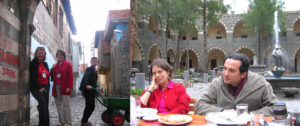
Diyarbakir, Turkey, March 2005. L to R: Joanne Leedom-Ackerman (PEN International Secretary), Jane Spender (PEN International Program Director), Carles Torner (Vice Chair Translation and Linguistic Rights Committee).
My predecessor as International Secretary Terry Carlbom had been instrumental in the planning, and we all agreed he should continue as coordinator of the seminar. Seventy delegates from a dozen countries gathered in the ancient city of Diyarbakir/Ahmed for five days. Diyarbakir dated back at least 5000 years, one of the oldest cities in the ancient land of Mesopotamia between the Tigris and Euphrates Rivers. Later it was dominated by Persia and by Alexander the Great. Because of its strategic position, Diyarbakir’s sovereignty changed many times, was part of the Roman empire, later conquered by the Arabs in 639, by Tamerlane in 1394; the Ottomans conquered in 1515. Diyarbakir continued through cycles of battles for control.
Old Diyarbakir was a standard Roman town circled by a wall, the stones of which still stood. The black basalt wall was said to be second only to the Great Wall of China. Within the walls a labyrinth of cobbled streets and alleyways unfolded, leading to towers where we could see the rivers and gardens and the city’s mosques and street life below, where caravan travelers used to stop on the silk road.
Before the conference began, PEN International Program Director Jane Spender and I explored the twisting paths and shared black tea in a central plaza with Carles Torner, vice chair of the Translation and Linguistic Rights Committee. As an American whose national history extended back barely 400 years, this accumulation of history in the streets and walls and buildings was mind-bending. In stones, in ideas…where did history reside and how did it evolve?
On the first evening Diyarbakir’s Lord Mayor Osman Baydemir greeted us at the Town Hall for a Newroz (New Year’s) reception. I thanked him on behalf of PEN for all he and the city had done to support this seminar. “It is a treat for us to visit one of the world’s oldest cities, with a history that could occupy the imagination of a community of writers like us for years to come,” I said. “Central to the Charter and ethos of PEN is a celebration of the universal which binds us as human beings and of the diversity which distinguishes each individual—the specific history, language and culture. It is our challenge and our aspiration as writers and members of PEN to provide the forums where cultures don’t clash but communicate. That is what we hope to do here in Diyarbakir.”
The first full day of the seminar we spent at the Newroz Festival. Our delegation was seated in an honored place in the bleachers which turned out to be behind the mother of Abdullah Öcalan, one of the founders and leaders of the PKK who was currently in prison. On the grounds in front of us spread thousands/ hundreds of thousands—some said a million people—celebrating the Kurdish new year, a time that coincides with the March equinox. Terry Carlbom and I were soon escorted to the main stage where we stood looking out over a sea of people as far as we could see, many in colorful local dress. Because PEN is specifically a nonpartisan/nonpolitical organization, we felt some ambivalence at the appearance of being swept into the Kurdish cause; on the other hand, the experience was one I won’t forget. The day was celebratory without violence. If there were political speeches, they were not translated for us, and we were accompanied by our Turkish colleagues who also attended.
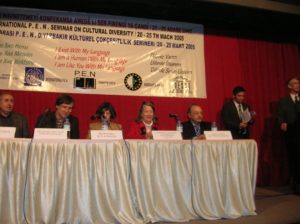
PEN Diyarbakir Conference on Cultural Diversity, 2005. L to R: Mehmed Uzun and Dr. Zaradachet Hajo (Kurdish PEN), Kata Kulavkova, (Chair, PEN Translation and Linguistic Rights Committee), Joanne Leedom-Ackerman, (PEN International Secretary), and Üstün Akmen, Turkish PEN
That evening in opening the conference, I noted, “In Diyarbakir/Ahmed this week we’ve come together to celebrate cultural diversity and explore the translation of literature from one language to another, especially to and from smaller languages. The seminars will focus on cultural diversity and dialogue, cultural diversity and peace, and language, and translation and the future. This progression implies that as one communicates and shares and translates, understanding may result, peace may become more likely and the future more secure.”
The official program began with the Lord Mayor and the President of Kurdish PEN Dr. Zaradachet Hajo and the President of Turkish PEN Mr. Üstün Akmen and a keynote speech by Kurdish author Mehmed Uzun. The following evening Turkish writer Murathan Mungan delivered an introductory address to a public gathering.
At the conference itself Kurdish and Turkish writers, poets, publishers and translators shared history and literature across their linguistic borders. Through discussion and readings and performances, they addressed the importance of cultural diversity as a value in a culture of peace.
Renowned Turkish/Kurdish novelist Yaşar Kemal, former president of Turkish PEN, had been invited but was ill and sent a message instead. He noted that the world was going through a difficult period and was faced with terrible destruction. He asked, “What makes human beings? Love, compassion, peace, friendship…Human beings are the only creative beings in the world.” Local cultures are being destroyed and with that is the destruction of languages and art and values, he said. In life and death we have to stand against a terrible destructive force in favor of local and national culture. “I believe your meeting will be successful,” he predicted.
Kata Kulavkova, Chair of the Translation and Linguistic Rights Committee emphasized the importance of the capacity to imagine, the importance of cultural memory and openness to dialogue. “Europe needs all identities, including Kurdish identities,” she said, noting that every culture is the center of the world for itself. “Turkish and Kurdish culture depend on each other to promote Turkish/Kurdish universal culture.”
Hüseyin Dozen of Kurdish PEN noted that literary translation helps a language to flourish; languages that are not standardized are enriched by literary translation which is an art rather than a scientific discipline. As far as languages that have no official status or have been prohibited, oral literature plays a central role, and the work of a translator must not neglect this kind of literature in his work.
PEN Vice President Lucina Kathmann led a discussion on “Bridging Borders” among women writers. Müge Sökmen of Turkish PEN moderated a discussion on Diversity and Literary Translation; Kurdish PEN member Berivan Dosky moderated a discussion on Cultural Diversity and Peace; Turkish PEN’s Vecdi Sayar led the discussion on Cultural Diversity and Dialogue, and Aysu Erden of Turkish PEN moderated a panel on Cultural Diversity and Linguistic Diversity.
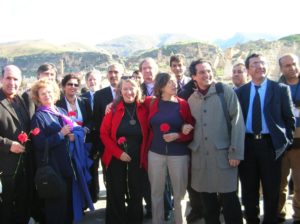
PEN trip to ancient town of Hasenkeyf, Turkey, 2005 including PEN International and Turkish and Kurdish members
One of the highlights of the conference was a visit to Hasankeyf, reputed to be the oldest continuing settlement on the planet and a cradle of civilization. Built into the sandstone cliffs in southeast Turkey, Hasankeyf had yielded relics that dated the site even earlier than the 12,000 years recorded, perhaps as old as 15,000 years. This Kurdish town of southeast Anatolia was threatened by a dam the Turkish government planned to build on the Tigris River. The Ilisu Dam would drown the town as the water was diverted and eventually would submerge Hasankeyf under as much as 400 feet of water.
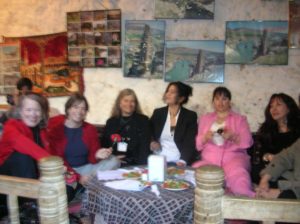
Lunch in a cave in Hasenkeyf, 2005, including PEN International representatives Joanne Leedom-Ackerman, Jane Spender and Lucina Kathmann
As we journeyed up the stone steps to the ruins of Hasankeyf Castle and later as we ate lunch in a cave, then bought small souvenirs from children who lived in the town, our delegation fell in love with the setting and the people. Several of us returned home and began writing about Hasankeyf in an effort to preserve its heritage. We were not alone. Worldwide protests to save this ancient site had been lodged, and the dam had been delayed. I set a google alert so that every time there was mention of the Ilisu Dam, I would know. Lucina Kathmann and I began exchanging latest news.
In spite of worldwide protests, the giant Ilisu Dam was completed after many delays in July, 2019. It began to fill its reservoir, tapping water from the Tigris River and diverting it from Iraq. The rising water levels are now slowly submerging the town of Hasankeyf, flooding the area which had been settled for millennia. The population for the most part has had to move. The waters have risen 15 meters and continue to rise around 15 centimeters per day, according to a February report by Reuters.
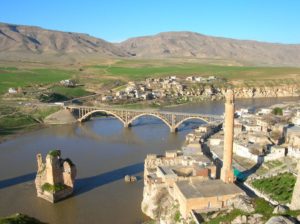
Hasenkeyf, Turkey, March 2005 during PEN Conference on Cultural Diversity, before the Ilisu Dam flooded the region.
Turkey’s rapprochement with the Kurds has also taken a turn away from the opening and the cultural diversity we celebrated in the 2005 Diyarbakir Seminar. But literature was exchanged there; friendships were made, and the dialogue among PEN members continues. Individual by individual has always been the strength and the modus operandi of PEN.
Next Installment: PEN Journey 35: Turkey Again: Global Right to Free Expression
PEN Journey 33: Senegal and Jamaica: PEN’s Reach to Old and New Centers
PEN International celebrates its Centenary in 2021. I’ve been active in PEN for more than 30 years in various positions and now as an International Vice President Emeritus. With memories stirring and file drawers of documents and correspondence bulging, I am a bit of a walking archive and have been asked by PEN International to write down memories. I hope this personal PEN journey will be of interest.
A few days before I flew out to Dakar, Senegal for a PEN conference in November 2004, my youngest son, a Marine in Iraq, called and told my husband and me that we would not hear from him for a while. We knew, without being told, that the U.S. and British troops were likely about to return to Fallujah, the center of the insurgency. Civilians there had been advised to get out of the city, and they were leaving.
On the opening day of the PEN conference in Dakar, November 7, 2004, the battle for Fallujah began. The headlines in the newspapers in Dakar were about the civil war raging in neighboring Ivory Coast so I was not reading about Iraq during the five-day PEN Africa meeting. In 2004 there were no iPhones or phone news feeds and rare coverage of the Middle East was on the evening news. I was quietly attentive each day and prayerful and focused on PEN’s work.
I have modest notes from the first PAN Africa conference, but I have some of my most vivid memories, most particularly of the people I met and of my first trip to Gorée Island just off the Senegalese coast opposite Dakar, a place of its own historic upheaval. Gorée Island was the site of the largest slave-trading center on the African coast from the 15th to the 19th century, ruled successively by the Portuguese, Dutch, English and French. The dungeons and portals to the sea where men and women and children were sent out in chains still stood along with the stucco houses of former slave traders.
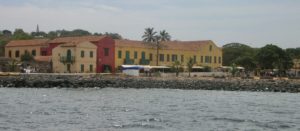
Gorée Island, site of slave trading in 15-19th centuries, off coast of Dakar, Senegal
A tall Gambian doctoral student assisting Senegalese PEN guided a few of us around Gorée. Fluent in French, English and Spanish, he was writing a doctoral thesis on the secrets of history and myth in the epic of Kaabu according to Mandingo oral traditions—clearly a future PEN member. Thoughtful, knowledgeable, he spent the day sharing history. During and after the Dakar meetings, our paths crossed in subsequent PEN conferences and congresses, and we know each other still. Dr. Mamadou Tangara earned his doctorate at the University of Limoges in France shortly after and eventually became the Gambian Permanent Representative to the United Nations. During Gambia’s constitutional crisis in 2016-17, he and other diplomats called for the president to step down peacefully; he was dismissed, but when power changed hands a few months later, he was reappointed as Minister of Foreign Affairs for the Gambia. The friendship with Mamadou Tangara remains and is one of my many valued friendships from PEN.
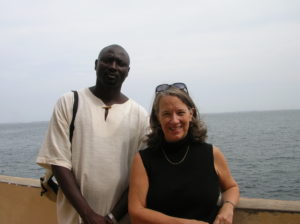
Mamadou Tangara (Gambia) and Joanne Leedom-Ackerman (PEN International Secretary) on Gorée Island at PEN’s 2004 Dakar conference
Mamadou’s mentor at the time was an older Gambian journalist and editor Deyda Hydara, who joined PEN members from more than a dozen African centers in this conference to prepare for PEN’s first PAN African World Congress in Senegal in 2007. The Congress would be PEN’s first in Africa since the 1967 Congress in the Ivory Coast when American playwright Arthur Miller was International PEN President. Though the Gambia didn’t yet have a PEN Center, Deyda was planning on starting one. At the time Deyda Hydara was co-founder and primary editor of The Point, a major independent Gambian newspaper. He was also correspondent for AFP News Agency and Reporters Without Borders and was an advocate for press freedom and a critic of his government’s hostility to the media.
A month after PEN’s Dakar conference, the Gambian government passed a bill allowing prison terms for defamation and another bill requiring newspaper owners to purchase expensive operating licenses and register their homes as security. Deyda Hydara announced his intent to challenge these laws. Two days later on December 16, 2004 Deyda Hydara was assassinated on his way home from work. To this day his murder remains unsolved. The following year Deyda Hydara won PEN America’s Freedom to Write Award posthumously and later the Hero of African Journalism Award of the African Editors Forum.
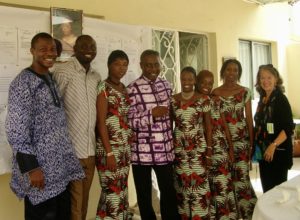
PAN Africa meeting at Senegal PEN offices. PEN L to R: Remi Raji (Nigerian PEN), Mamadou Tangara (Gambia), Mike Butscher (Sierra Leone PEN), Joanne Leedom-Ackerman,( PEN International Secretary) and Senegal PEN assistants
Deyda Hydara was a dynamic voice for writers at the PEN Dakar conference and for the need of PEN’s African centers to work together against repressive press laws.
The theme of the Dakar meeting—“New Partnership for African Development and Culture”—involved coordinating work among PEN’s African centers, including the nomination of a candidate for International PEN’s board at the 2005 Congress in Bled, Slovenia, assistance to dormant African centers and support for creating new African centers. (There are now more than 25 PEN centers in Africa.) Several African PEN centers also committed to working together in fundraising for projects. Remi Raji of Nigerian PEN took on the role of PAN coordinator, and Mike Butscher, executive secretary of Sierra Leone PEN, was the administrator.
PAN (PEN African Network) was relatively new. In 2001 Dr. Vincent Magombe, a Ugandan journalist and member of PEN’s African Writers Abroad Center and member of PEN’s first International Board and Terry Carlbom, PEN’s International Secretary, had taken a trip to visit many PEN African centers in order to promote activity and develop greater participation in Africa. At the 2003 Mexico Congress members from seven of PEN’s African centers met to launch the PEN African Network (PAN). At the 2004 Congress in Norway representatives from twelve African centers came together for a PAN meeting. By Dakar PAN had grown to over a dozen of PEN’s African centers who agreed to help plan the 2007 World Congress in Dakar.
The implementation and heavy lifting for the Congress would depend on PEN Senegal, one of the oldest and best organized of PEN’s centers in Africa. Senegalese PEN had offices, a small theater and even housing for visiting writers, administered by its General Secretary, poet Alioune Badara Bèye. Because the country’s first President (1960-1980) Leopold Sédar Senghor was himself a renowned poet and a Vice President of International PEN, Senegal had a long tradition of support for literature that was unparalleled in most countries.
The Dakar PAN conference opened on the International Day of the African Writer and was coordinated with the Senegalese Writers’ Association and presided over the by the Minister for Culture. The ceremonies included a literary evening along with traditional Senegalese instrumental ensembles and dance.
The planning work for the 2007 Congress got underway the following day in a large meeting room in Senegal PEN’s writers’ compound. As International Secretary, I addressed the gathering and shared a 1922 news report about PEN that began: Le Coeur n’a pas de pays. (The heart has no country) then continued: “Today when many are claiming a clash of civilizations and fear across borders is rising, PEN can continue to demonstrate international fellowship through its literary programs, its work on behalf of imperiled writers, its support of writing in all languages and cultures, its assistance to writers in exile and its development of new centers, particularly in Africa. PEN’s strength is its members, and it is a pleasure to be here with committed writers from some of PEN’s strongest and also PEN’s emerging African centers.”
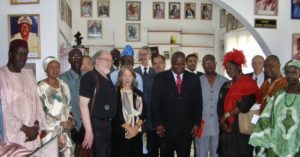
International Day of the African Writer and PEN’s PAN Africa conference at Senegal PEN. Participants, including far left Alioune Badara Bèye, (General Secretary, Senegal PEN), Kjell Olaf (Norweigan PEN), Joanne Leedom-Ackerman (PEN International Secretary/American PEN), Femi Osofisan (Nigerian PEN), Terry Carlbom (Swedish PEN), Senegal Minister of Culture, Deyda Hydara (Gambia), Mike Butscher (Sierra Leone PEN) and other PEN members and officials.
Given the conflict next door in the Ivory Coast and in Iraq, Afghanistan and other areas of the world, it seemed especially important to have these positive actions of fellowship growing. While the PAN conference was serious in purpose, it was also full of comradery. I chaired one session and remember looking out at the table of more than a dozen men and only one woman besides myself. I suggested at PEN’s follow-up conference in Ghana next spring, the centers include their women members. The men looked around the table as though only now noting the imbalance. I smiled. The other woman at the conference Koumanthio Zeinab Diallo from Guinea spoke French, and when the translator repeated my words to her in French, she smiled. C’est vrai! and nodded her approval.
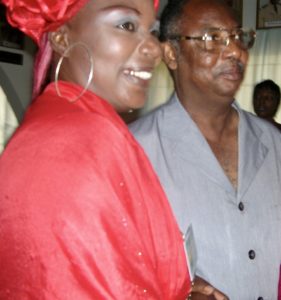
Zeinab Diallo (Guinea PEN) and Deyda Hydara (Gambia) at 2004 PEN PAN Conference in Dakar, Senegal.
Since I had taken on the position of International Secretary, I’d been studying French to get to a passable conversational level. It turned out Zeinab was studying English with the same goal. Mamadou Tangara set up a competition between us which he judged every time the three of us saw each other over the months and years ahead at PEN meetings. Even with our salad of language, Zeinab and I communicated and often laughed together though I don’t think either of us achieved the fluency we wanted. A poet, Zeinab wrote in Pular as well as French. She also worked as an Agricultural Engineer and was a development consultant for the UN Development Programme.
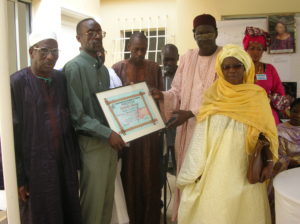
Senegal PEN members including General Secretary Alioune Bedara Bèye presenting tribute posthumously for Senegal writer and member Fatou Ndiaye Sow.
At the PAN conference Senegalese PEN presented an award and tribute to its member Fatou Ndiaye Sow who had passed away just the month before while attending a meeting abroad. A poet, teacher and children’s writer, Fatou had been a friend to many of us and was an early member of PEN International’s Women’s Committee. I read a tribute to Fatou by Lucina Kathmann, a close friend of hers and early chair of PEN’s Women’s Committee.
When I took on the role of International Secretary a few months before, there was already a full agenda underway, and I was grateful to Terry Carlbom, my predecessor, and to Jane Spender, the Administrative Director; Terry also attended the Dakar conference. The next three PEN Congresses were lined up to be developed—Bled, Slovenia in 2005, Berlin, Germany in 2006, and Dakar, Senegal in 2007. Each of these would be hosted by experienced PEN centers so while much work was yet to be done and funds raised for these Congresses and for other activities ahead, solid groundwork had been laid.
A new initiative in those early days as International Secretary was to revive and develop PEN’s presence in the Caribbean. The request originated with the UNESCO representative in Jamaica who was himself a writer. A proposal to explore the possibility was developed in partnership with Canadian PEN’s Executive Director Isobel Harry, who’d spent time in Jamaica, had known one of its most famous residents, musician Bob Marley, and knew numbers of Caribbean writers living in Toronto, some of whom were members of Canadian PEN.
Historically, the Caribbean had been underrepresented in PEN except for the existing Puerto Rican Center and a Jamaican PEN Center that had been active from 1948 until the early 1980’s but had disbanded in 1987.
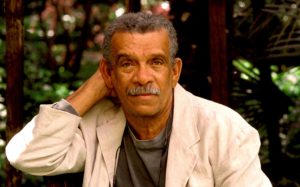
Poet/playwright Derek Walcott, winner 1992 Nobel Prize for Literature. (photo credit: Effigie/Leemage/Writer Pictures)
The Caribbean was enjoying a literary renaissance with events like the CARIFESTA (Caribbean Festival of the Arts), the Calabash Literary Festival and with St. Lucia’s Derek Walcott winning the Nobel Prize for Literature.
In early December, 2004 Isobel and I traveled to Jamaica to meet with writers, professors and UNESCO to determine who and how a PEN center might be launched. PEN Canada had an ongoing relationship with Caribbean writers as did Quebecois PEN, which was working with Haitian writers to help develop a PEN center there. Haitian writer Georges Anglade, who lived part time in Montreal and was the founding President of Haitian PEN, had recently attended the PEN Congress in Tromso, Norway. (Ref Haitian Farewell)
At the minimum, to form a new PEN center at least 20 qualified writers have to come together, sign and agree to commit to the Charter of PEN and propose a reason and program for their center.
Isobel and I flew to Kingston, arriving from the early blasts of winter into the Jamaican sun. It was not hard duty. Over the course of three days we met with a dozen writers, professors, festival organizers, human rights activists and the UNESCO representative Alwin Bully, who was also Chair of the CARIFESTA Task Force. UNESCO’s mandate was to integrate the Caribbean, and Alwin Bully saw PEN as a unifying organization and thought a PEN Center might include writers from many of the Caribbean islands.
Isobel and I met with him several times as well as with the founders and producer of the Calabash International Festival and with journalists from the Jamaica Observer, professors at the University of the West Indies, chief curator of the National Art Gallery, the Vice Chancellor of the University of the West Indies, and the former head of the Human Rights Council. All were enthusiastic about the possibility of a PEN Center.
Colin Channer and Kwame Dawes, founders of the Calabash International Literary Festival, offered to host a planning meeting before the next festival. UNESCO offered to fund the workshop/planning session and include writers from many Caribbean countries. The Vice Chancellor of the University of the West Indies, which had three main campuses in Barbados, Trinidad and Jamaica, said the university could perhaps provide institutional support. Professor Carolyn Cooper of the Department of Literature in English and board member of the Calabash Festival and a writer said she’d be glad to be a founding member and help recruit so that the PEN center had an inclusive group of all types of writers.

L to r: Novelist Colin Channer (photo credit: Allison Evans), poet Kwame Dawes (photo credit: Andre Lambertson), founders of Calabash International Literary Festival, and Professor Carolyn Cooper of the University of the West Indies (photo credit: Isobel Harry)
Florizelle O’Connor, the former head of the Human Rights Council and member of the UN Sub Commission on Human Rights was also enthusiastic about a PEN center. She felt the right to freedom of expression and access to information were issues that needed protecting in Jamaica and the Caribbean.
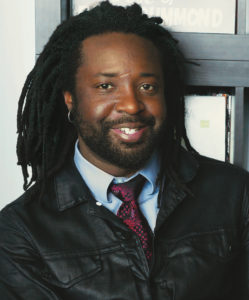
Novelist Marlon James, 2015 Man Booker Prize winner
Questions arose on where a Caribbean PEN center would be located—Jamaica, Trinidad, other? Other writers, including journalists from the Jamaica Observer, emphasized that a center would need equal representation of writers and journalists and no one constituency should be keeper of the PEN flame.
Writers who lived part time in Jamaica and part time in Toronto, New York, London and elsewhere noted that most writers far from home sought ways to keep strong the bonds and identity with the Caribbean; a PEN center could help. Each interview resulted in a list of at least four to six more people to speak with, including later Marlon James, who would eventually win the Man Booker Prize.
At the end of our three-day trip circling Kingston aglow with red, green and gold Christmas lights and swaying palm trees, we concluded a PEN Center would happen. At its best it could bring together writers, journalists and creative people in the islands and provide further access to each other, broaden access to the world of literature and enable writers to present a collective voice for greater impact on issues such as freedom of expression.
The writers would have to decide the questions ahead—who would be eligible, the balance of journalists and creative writers and the diasporic writers whose numbers might exceed the local writers. A large unresolved question was whether the PEN center would be Jamaican PEN as in the past or a pan-Caribbean PEN.
As we left the island to return to our winter, it was agreed the discussions would continue among the writers, including those Caribbean writers in New York, Toronto and London and with UNESCO. A workshop/planning meeting in association with the Calabash Festival and the University would be held, probably in May 2005. Isobel would return.
In 2006 the Jamaica Center was voted into PEN at the Berlin congress and joined over 135 PEN centers worldwide.**
Next Installment: PEN Journey 34: Diyarbakir and Beyond—Finding Byways for Peace
——————-
*Current African PEN Centers: Afar, Afrikaans, Algerian, Egyptian, Eritrean in Exile, Ethiopian, Gambian, Guinea-Bissau, Guinean, Ivory Coast, Kenyan, Liberian, Malawian, Malaysian, Mali, Mauritania, Moroccan, Nigerian, Senegal, Sierra Leone, Somali-Speaking, South African, Togo, Tunisian, Ugandan, Zambian, Zimbabwe
**Current Caribbean PEN Centers: Cuban, Haitian, Jamaican, Puerto Rican
PEN Journey 32: London Headquarters: Coming to Grips
PEN International celebrates its Centenary in 2021. I’ve been active in PEN for more than 30 years in various positions and now as an International Vice President Emeritus. With memories stirring and file drawers of documents and correspondence bulging, I am a bit of a walking archive and have been asked by PEN International to write down memories. I hope this personal PEN journey will be of interest.
PEN is a work in progress. It has always been a work in progress during its 100 years. Governing an organization with centers and members spread across the globe in over 100 countries can be like changing clothes, writing a novel and balancing a complex checkbook all while hang gliding. Perhaps an exaggeration, but not by much.
In 2004 the leadership of President and International Secretary were at the center of the governing structure along with the Treasurer and a relatively new Board. The President represented PEN in international forums. The International Secretary was tasked with overseeing the office and the centers of PEN and with any tasks the President handed over like running board meetings and setting up the agenda for work. The concept was that PEN should be able to elect as President a writer of international stature to represent PEN in global forums but not have the obligation to run the organization. That could be the role of the International Secretary, along with the Board and staff.
When I assumed the role of International Secretary, PEN did not yet have an executive director, though the consensus had built from the strategic planning process that we needed one. Both the President and International Secretary were volunteer, unpaid positions, which meant they were not full time. At the post-Congress board meeting after Tromsø, we agreed to begin a search for an executive director.
I suggested monthly board meetings, which had not been the practice. We could do these by phone, which meant there were only a few hours a day when everyone would be awake. If Judith Rodriguez in Melbourne, Australia could stay up past 11pm and Eric Lax in Los Angeles didn’t mind waking up at 7am, the rest of us—Takeaki Hori in Japan, Sibila Petlevski in Croatia, Eugene Schoulgin in Norway, Elisabeth Nordgren in Finland, Cecilia Balcazar in Colombia as well as President Jiří Gruša when he joined from Vienna or Prague and me in Washington, DC or London—could find our time zone and call in. The technology was not as sophisticated as today, and we didn’t yet use skype so the calls were not cheap, but we began to manage each month.
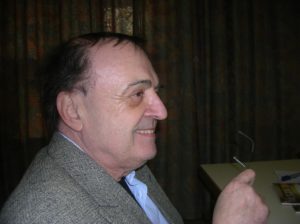
International PEN President Jiří Gruša
As International Secretary, I was in charge of overseeing the office and staff, working with centers on conferences and projects and along with Jiří, liaising with our partners like UNESCO. Administrative Director Jane Spender and I drew up the agenda for each board meeting. I always checked with Jiří to see if he had items to add and to see if he wanted to join the board meeting. I chaired most of the board meetings and much of the Assembly of Delegates at the Congresses. English was not Jiří’s first or second language, and he had other large obligations. During his presidency, he took on the Directorship of the Diplomatic Academy of Vienna, where we held our winter board meetings. This division of tasks between Jiří and me was quite different when the next President John Ralston Saul took on the presidency in 2009, along with Takeaki Hori as International Secretary. John was a much more hands-on President than Jiří. The President and International Secretary were a team and usually agreed between them who would do what.
One of my most important and enjoyable partnerships was with Administrative Director Jane Spender, who was promoted to Program Director for Jane had been instrumental in the thinking and execution of PEN International programs first years. I tried to spend at least a week to 10 days each month in London or on the road for PEN. I was able to finance my travel outside of PEN’s budget. Jane and I worked closely together as we outlined what yet needed to be done in PEN’s move to modernize systems. Each International Secretary had operated in a way that worked for the time. In my tribute to retiring international Secretary Terry Carlbom, I’d noted that early in PEN’s life, around 1924 at a meeting in Vienna, the French representative had turned to the German representative and said, “PEN means Paix Entre Nous (“Peace between us.”).* Members did not always agree with each other and would perhaps even get angry, but the hope was that members would honor and serve that acronym well.
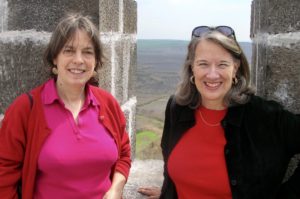
L to R: International PEN Program Director Jane Spender and PEN International Secretary Joanne Leedom-Ackerman at the wall surrounding Diyarbakir, Turkey in March, 2005.
After Terry debriefed me at the PEN Congress in Tromsø, one of my first visits was to Paris to talk with former International Secretary Alexander Blokh, who had held the position for 17 years, to listen to his experience. The times and the demands were changing from Alex’s day as PEN grew and as the world sped up and shrank at the same time with the advent of the internet.
One of my early calls was to George Gawlinski, who had taken PEN through the strategic planning process in Bellagio in 2003 (see PEN Journey 28). George’s advice was that we hire an interim executive director while we did a search for an executive director. He said he happened to know that one of the best in that business was available, a man named Peter Firkin. He could come in, help us get systems in place like employment policies which we didn’t have, a budget which we didn’t have and help set up the systems the office would need to appeal to a first rate executive director and also begin relieving the impossible workload Jane and the staff bore. Jane and I interviewed Peter together. After about twenty minutes (or less), we exchanged relieved glances over the table and knew we had found who we needed for that moment.
A grey-haired New Zealander with wide experience with organizations and a love for books, Peter spoke with the Board and Jiří, and PEN hired him to come in several days a week to begin helping, including assisting in the search process. My notebook of lists had already grown quite full, and now these lists Jane and I allocated among the three of us. One of the big tasks was to develop an overall budget for the organization. The Writers in Prison Committee operated with a budget, but the rest of the organization operated project by project and at the end of the year, a list of expenses and income was recorded. There was not a budget projected forward for the whole organization, rather an accounting of money spent and money received. The only way to draw up PEN’s first budget was to look at what was spent the year before and project forward. The budgeting processes also needed to be set in place. American PEN sent over its financial director to work with the London office for a week with Jane and Peter and the Treasurer Britta Junge Pedersen and bookkeeper Kathy Barazetti. It took a while, but we eventually had a comprehensive, estimated budget for the whole organization.
Another task was to revise our status with the British Charity Commission, which oversaw all charities in Britain. The work of human rights organizations had been regarded as being political in nature, therefore not permitted charitable funds. Some organizations like International PEN had set up charitable trusts—the International PEN Foundation—to raise funds for their educational work. But with a change in the law, human rights organizations were now accepted as a-political. With Peter’s help we found a law firm that could take us through the process to dissolve the International PEN Foundation so International PEN could operate as one charitable organization.
We also found new and highly respected auditors. All these were the nuts and bolts on the continued journey to improve and modernize International PEN. During Terry Carlbom’s tenure as International Secretary, we had gotten rules and regulations and procedures updated and approved and the strategic planning process underway. The tasks and lists to get International PEN operating more efficiently seemed endless, but each day Jane and I checked more items off the lists.
We hired a highly recommended search firm, which Human Rights Watch had used successfully. Jane and Sara made it clear they did not want to be considered for the position of executive director. Jane was made the Program Director and Sara remained the Director of the Writers in Prison Committee. The board set up a committee to oversee the search, to read resumes given us, help set out the tasks and interview questions for finalists and ultimately to interview final candidates. The committee included Eric Lax, Eugene Schoulgin, myself, and Peter Firkin. We consulted closely with Jane and Sara who also interviewed the finalists.
All of this work related to the systems of the organization and were interesting and enjoyable because of the colleagues I was working with even with long hours and sandwiches for dinner at the office. But the most fun was the programs and going out into the world and working with writers. My first trip was to Dakar, Senegal, where one of our oldest African Centers had committed to host the 2007 PEN Congress and was bringing together all the African centers for a conference. One of PEN’s early Vice Presidents had been poet Leopold Senghor, who was also the first President of Senegal. A sentence I wrote and memorized before going there I remember to this day: Il n’a que qelques autre pays dans le monde ou l’ecrivain est plus honore qu’au Senegal. “There are few countries in the world where the writer is more honored than in Senegal.”
In December I left for Jamaica with Canadian PEN’s executive director Isobel Harry. Writers in Jamaica, along with UNESCO’s representative there, wanted to start a PEN Center for the Caribbean.
*P.E.N. acronym stands for Poets Essayists and Novelists; along the way it expanded to Poets Essayist/Editors and Novelists
Next Installment: PEN Journey 33: Senegal and Jamaica: PEN’s Reach to Old and New Centers
PEN Journey 31: Tromsø, Norway: Northern Lights
PEN International celebrates its Centenary in 2021. I’ve been active in PEN for more than 30 years in various positions and now as an International Vice President Emeritus. With memories stirring and file drawers of documents and correspondence bulging, I am a bit of a walking archive and have been asked by PEN International to write down memories. I hope this personal PEN journey will be of interest.
The week before PEN’s 70th World Congress in Tromsø, Norway in the Arctic Circle, my oldest son competed in the Athens 2004 Olympic Games, the only wrestler to qualify for TeamGB (Great Britain). He had dual citizenship and was the first British champion to qualify for the Olympics in wrestling in eight years. In his sport, there was no seeding of competitors; instead, after making weight, each wrestler reached into the equivalence of a hat and drew their first round competitions. True to his history, my son drew the best opponents. As one news commentator noted: “Coming to the mat is Nate Ackerman, born in the US, wrestling for Great Britain, getting his PhD in mathematics at the Massachusetts Institute of Technology…but that won’t help him now as he faces the three-time World Champion from Armenia.” My son lost to the Armenian wrestler. His other opponent was the world bronze medalist from Kazakhstan who went on to win the silver medal at the Olympics. Though my son didn’t win either match, he also didn’t get pinned, and he wrestled nobly. The Olympic Games in Athens was a magical time.

Olympic circles projected in light on the Acropolis at the 2004 Olympic Games in Athens
I was heading to Tromsø with a smile inside, though behind my smile was also a quiet attention that never left me for my youngest son, a Marine, was in Anbar Province, Iraq that summer, patrolling in 120° and alert for IED’s and snipers along the roadside. He had missed his brother in the Olympics and his brother missed being able to talk with him.
As I changed planes in northern Europe, I realized I was going to need a coat in the Arctic Circle and bought a light foldable one at an airport shop which I took to a decade worth of PEN Congresses after. On the plane I reviewed the stack of PEN papers and resolutions.
I was arriving at the Congress having agreed to stand for International Secretary. (See PEN Journey 30). The other PEN member standing was Giorgio Silfer, a poet and playwright and president of Esperanto PEN.
Norwegian PEN hosted over 300 writers, editors, and translators from at least 60 countries for the 70th World Congress whose theme was Writers in Exile—Writers in Minority Languages. The Rica Arctic Hotel where we stayed and met was an easy walk to the small downtown of Tromsø, capital of northern Norway, well above the Arctic Circle and called “the Paris of the North.”
Kjell Olaf Jensen, President of Norwegian PEN, reminded delegates that the Congress themes reflected the literary scene of Tromsø, which would soon join the International Network of Cities of Asylum as the fifth Norwegian city. (This network later developed into the International Cities of Refuge Network (ICORN) in 2006 with PEN’s Writers in Prison Committee as a partner and with the inaugural meeting in Stavanger, Norway.) One of the guiding voices in the exile network Professor Ole Danbolt Mjøs, director of Tromsø University’s Peace Center and President of the Norwegian Nobel Committee, spoke at the Welcome Party Ceremony as did Ole Henrik Magga, President of the Sami Parliament. Half of the estimated 50,000 Sami in the world lived in Norway. Crown Prince Haakon of Norway officially opened the Congress the next day noting, “Freedom of speech is a source of power. If used constructively, it is amazing what speech can do. It can fight corruption, free political prisoners, and make oppressive regimes crumble.”
The two themes of writers in exile and writers in minority languages intertwined throughout the Congress with readings and round tables at cafes and pubs in the midst of Tromsø’s annual International Literary Festival and the International Nana Festival of Aboriginal people. Literary and musical programs included the Sami singer Mari Boine in the Arctic Cathedral and the work of the celebrated but deceased Sami poet, singer, and writer Nils Aslak Valkeapaa. PEN’s programs highlighted some of Norway’s own writers in exile: Mansur Rajih from Yemen, Soudabeh Alishahi from Iran, Islam Elsanov, a film maker from Chechnya, and Chenjerai Hove from Zimbabwe as well as guests Reza Baraheni (Iranian writer living in Canada), Turkish activist Şanar Yurdatapan, and former Russian prisoner and writer Grigory Pasko.
A conference at Tromsø University under the theme “Should Writers Live in Prison?” preceded the Opening Ceremony. Storyteller Easterine Iralu of the “Nagaland nation” addressed the delegates in the main lecture hall: “Every man is a story and every nation is a bristling galaxy of stories. Every nation should be given the right to tell the story by its own story tellers…We are an oral society. Naga writing is an aboriginal achievement.”
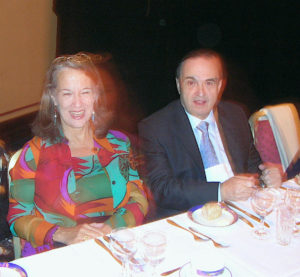
New PEN International Secretary Joanne Leedom-Ackerman and PEN International President Jiří Gruša at 70th PEN Congress in Tromsø, Norway, 2004
In later panels Lebanese novelist Amin Maalouf said, “Poets and writers must reinvent the world. This is not a task to be left to politicians. Is this a century of bombs or poems?” Norwegian bestselling author Jostein Gaarder expanded the questions: “How wide are the ethical horizons of literature and art? The question for writers and artists at the start of the third millennium must be what shift in consciousness do we need? Literature is nothing less than a celebration of mankind’s consciousness. So shouldn’t an author be the first to defend human consciousness against annihilation?”
At his first Congress as PEN International President Jiří Gruša told the delegates, “I myself have experienced persecution and really esteem people who help authors to freedom. I know how vital it is to have somebody outside the prison who cannot be stopped. ” He challenged writers to invent and combine practical and stylistic literary methods “to conquer plagues and pestilence that threaten human, moral and planetary evolutions.” He and the delegates of the Congress condemned recent terrorist attacks on a school in Beslan, Russia which had taken the lives of hundreds of children just a few days before. Jiří also paid respect to poet, Nobel laureate and PEN member Czeslaw Milosz, who had recently passed away. “It is with deep grief that the PEN family sympathizes with the people of Poland. We shall miss him, but his work will continue to inspire people from one end of the world to the other.” Milosz was a member of the Writers in Exile American Branch of PEN.
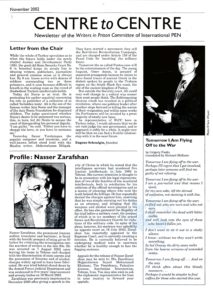
Writers in Prison Centre to Centre newsletter featuring poem by Grigory Pasko, honored guest at 70th PEN Congress and article about prisoner Nasser Zarafshan.
In addition to attending the rich literary panels and discussions, PEN’s Assembly of Delegates passed a resolution that urged authorities to assist in freeing Christian Chesnot and Georges Malbrunot, two French journalists currently held hostage in Iran. Encouraged by Nicaraguan poet Ernesto Cardenal, delegates and participants also signed a petition to the Islamic Republic of Iran demanding that Dr. Nasser Zarafshan’s life be protected and that he be immediately and unconditionally released. Delegates also signed a petition to the President and Government of Russia calling for a multilateral dialogue and an end to the violence in Northern Caucasia and a restoration of civil living conditions in the Chechnyan Republic, including open access so that local and national media could report events in the region. (Chesnot and Malbrunot were released from Iran a few months after the Congress, in late December, 2004. Zarafshan was not released until 2007.)
The Assembly passed resolutions from the Translation and Linguistic Rights Committee (TLRC) urging authorities of the Russian Federation to grant cultural rights to all minorities, including use of regional languages, and the same appeal was sent to authorities in Turkey, Iran and Syria regarding Kurdish language and culture.
Writers in Prison Committee (WiPC) resolutions which the Assembly passed focused on the repression of free expression for writers seeking asylum in Australia, on harassment of certain journalists in Canada, attacks on writers in Chechnya, imprisonments in China and Cuba, censorship and harassment of writers in Egypt, arrests in Eritrea, hostage-taking in Iraq, detentions in the Maldives, killings in Mexico, detention and ill treatment in Myanmar, murder in Nepal, killing and disappearances in Russia, bombings and assassinations in Spain, imprisonments in Turkey, restrictions on the free flow of international writing in the U.S., imprisonments in Uzbekistan and Vietnam, and restrictions on free expression in Zimbabwe.
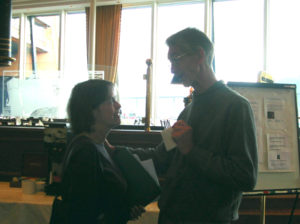
Administrative Director Jane Spender and PEN International Secretary Terry Carlbom at 70th PEN Congress in Tromsø, Norway, 2004
The WiPC resolutions had been discussed at the earlier Writers in Prison Committee meeting where a new chair had been elected from four candidates. Karin Clark of German PEN would replace Eugene Schoulgin, who was stepping down after four years and was running for the Board of International PEN.
At the Assembly of Delegates, Eugene introduced guest of honor, former Russian main case and journalist Grigory Pasko, who told the delegates that “although he had not been able to thank all those who had worked on his behalf while he was in prison, he now would like to thank everyone again and again. Unfortunately he could not now say that Russia had become more democratic, but he would continue to fight to make it so, supported by all his friends in the Assembly hall.”
Election for the Board of PEN included eight candidates for three open positions. Eric Lax (PEN USA West), Judith Rodriguez (PEN Melbourne), and Eugene Schoulgin (Norwegian PEN) joined the Board. Three new centers—Basque, Guatemala and Kosovo—were admitted into PEN.
At his last Assembly as International Secretary Terry Carlbom told the delegates, “Our greatest strength is ultimately our capacity for empathy, compassion and solidarity. Ours is not the solidarity of the collective herd; it is the solidarity of the concerned and caring individual, a solidarity with a fragile world and fragile civilization. And the solidarity that sometimes can provide comfort in the rather lonely process of creative writing…I have been proud to serve.”
At the Congress Terry saw the passage of the final amending resolutions on the Regulations and Rules of Procedure he had dedicated a significant portion of time to as International Secretary. Updating rules and regulations to bring them in line with the changes PEN had made to its governance was not a task for many writers. I was grateful to Terry that these documents were now drafted and a working document for strategic planning was in hand.
The election for Terry’s replacement as International Secretary was between Giorgio Silfer (Esperanto PEN) and myself. Giorgio’s speech to the Assembly was a poem, an unusual and memorable presentation for office. Giorgio was a linguist and a poet and participated actively on the Peace Committee and Translation and Linguistic Rights Committee. I was a novelist and journalist and activist on the Writers in Prison Committee and Women’s Committee. We had both worked with all committees, but we had our corridors and respected each other. My statement was more traditional.
I was elected the new International Secretary of PEN. I glimpsed the work ahead when I sat down with Terry in the hotel lounge after the election. He told me in November I needed to be at Senegal PEN‘s conference with African centers in Dakar in preparation for the 2007 PEN Congress there, and in the spring I was in charge of a conference PEN was holding in Diyarbakir, Turkey with Kurdish and Turkish PEN. Great, I said. Can you show me the budget and program for the Diyarbakir conference? Terry explained that we didn’t have a budget yet, but he offered to continue helping with this conference. I was to learn quickly that unlike the Writers in Prison Committee, the rest of International PEN worked in a more unstructured fashion, without clear budgets but with relationships that usually came through. I began making lists. My tenure as International Secretary would include notebook after notebook of lists of tasks to be done.
A solace as I left that meeting was that I would be working with Jane Spender, Administrative Director, who was smart, a friend, and had gotten PEN through remarkably tight places before. Jane and I both knew that time was not on our side if we didn’t modernize further. I put on my new PEN coat and went for a brisk walk with Jane in the drizzle towards the next venue. PEN International had been asked for the first time by a major funder to provide an evaluation of a major grant. No one before had asked that of PEN, but it would surely be asked more and more in the future. We walked down the wet Tromsø streets considering what was before both of us. We had to figure out how to do an evaluation and much more…
Next Installment: PEN Journey 32: London Headquarters: Coming to Grips